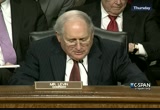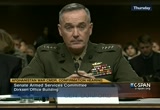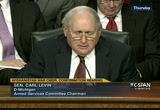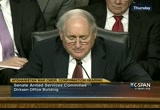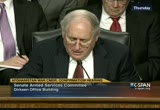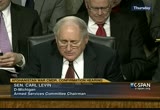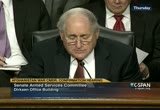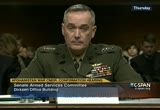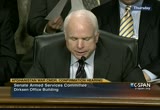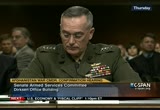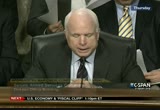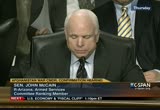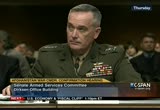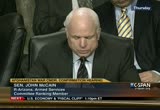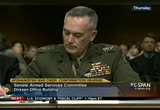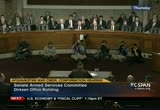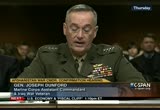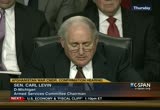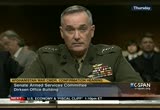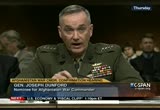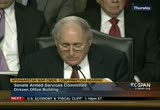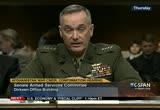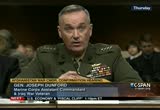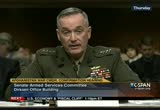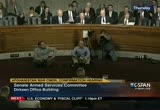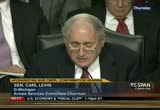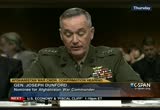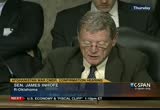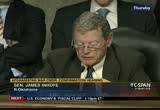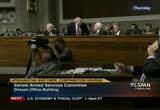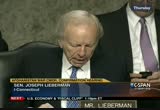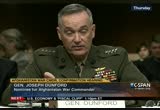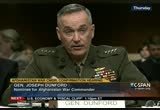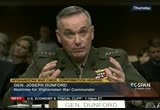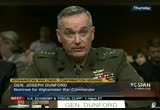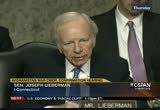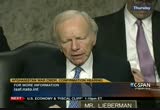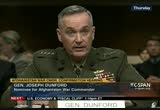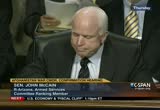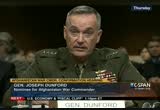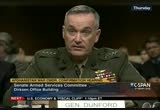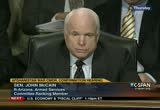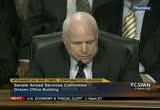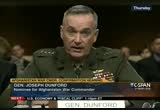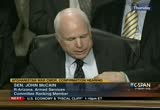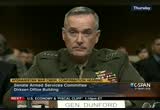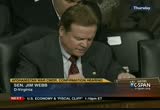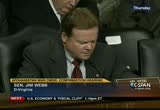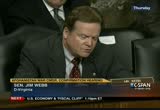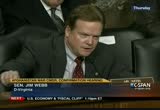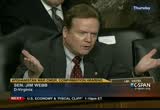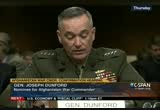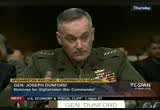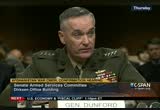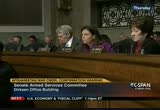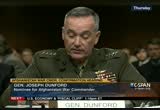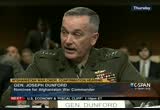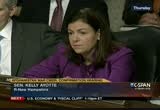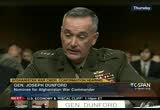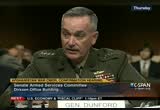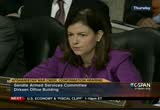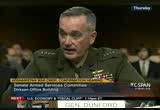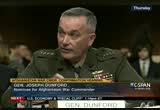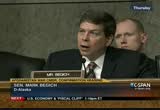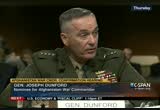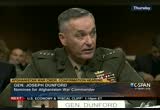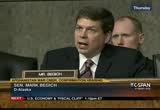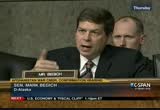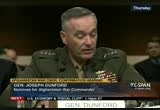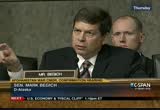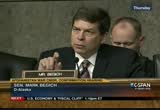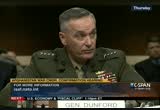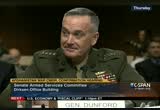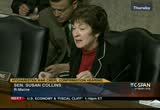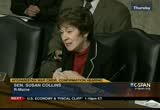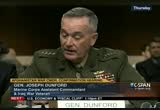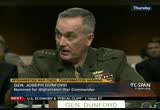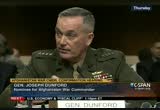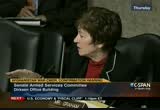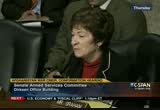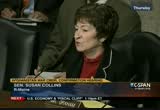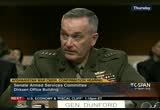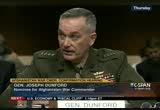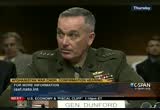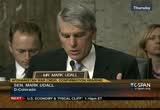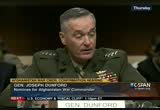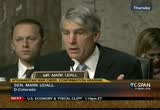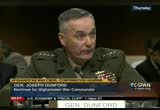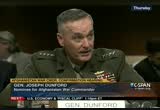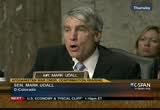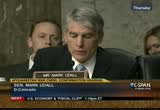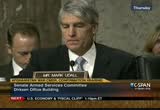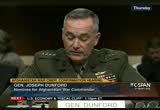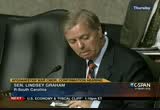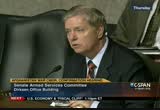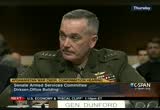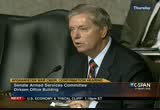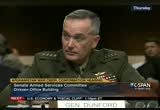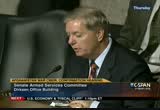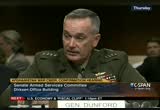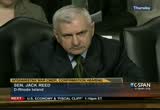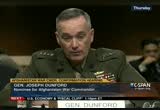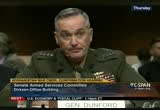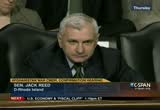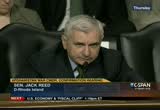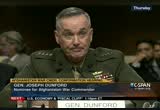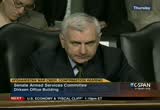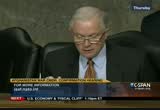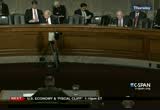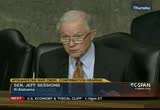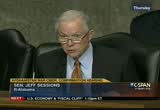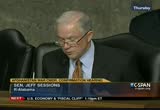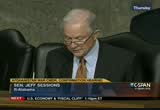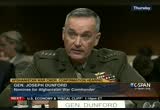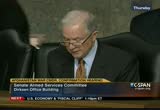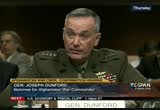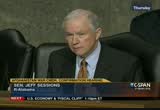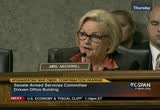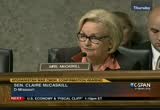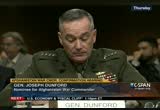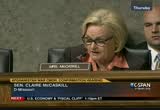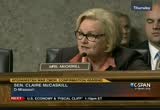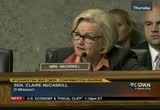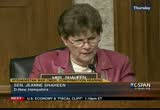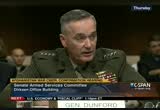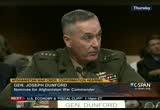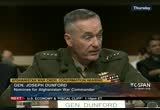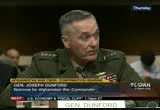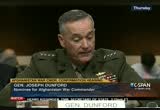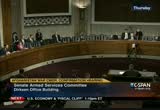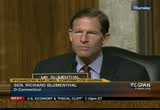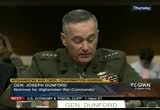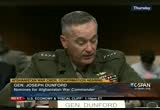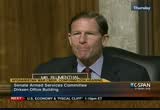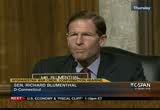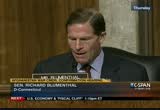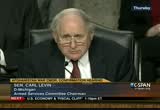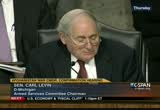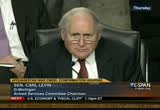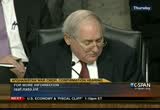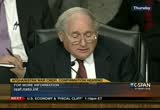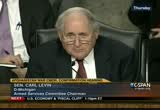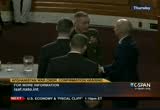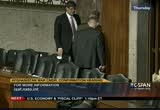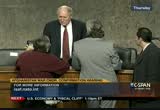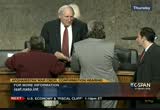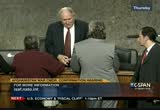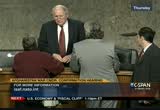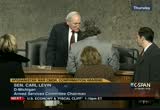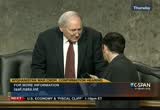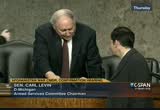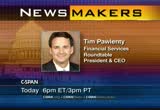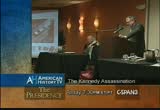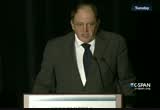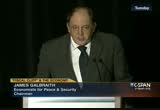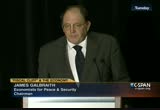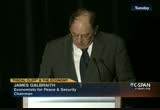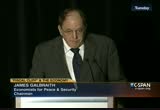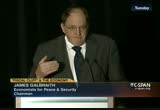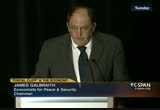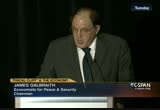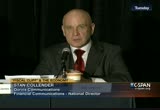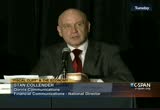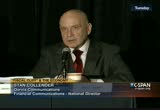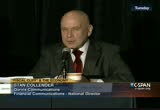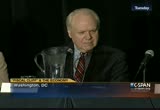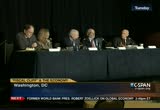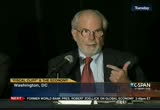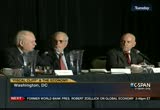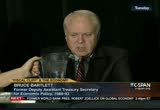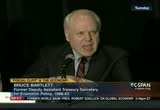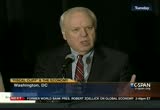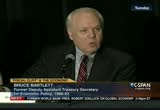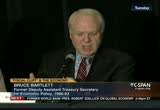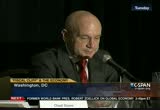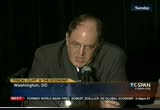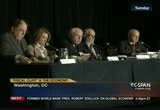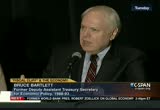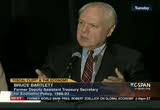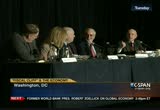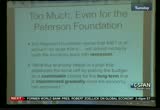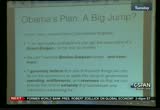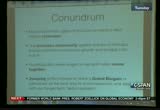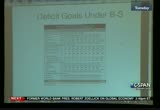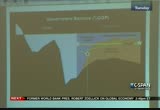tv Washington This Week CSPAN November 18, 2012 10:30am-2:00pm EST
10:30 am
the table which includes increasing taxes on the wealthy so we will see if that ends up being part of the deal. host: what about the gop pledge are not raising taxes? how does that? now i play to the party? in 2010, the tea >> that dynamic played itself out in the new congress. there was a near-government shut down at one point. now, as we get to the 2012 season, we see the tea party not having the same level of influence in terms of those races. before hand, speaker boehner had a hard time getting some of his more conservative members to buy in to certain concrete hiatt -- compromises. going forward, we will have to see if the tea party conservatives will seem to have
10:31 am
the same support. the president now has the upper hand and when he talks to speaker boehner he will have to take that message back and he gets a little bit more behind him. >> week and a shop with a meeting between the leaders and the white house. what is the dynamic? >> it will be very interesting to see. hopefully we will hear from them exactly what their conversation was with the president. it is unlikely that we're going to see a detailed agreement on specific issues. are we going to hear about tax breaks or how entitlement reform is going to happen in the deal? on not sure. these figures are going to be out there. they're all going to be scrambling to set the tone in the way that they want to set it. of they will have discussions like the democratic leaders also say let these are the areas
10:32 am
where we made clear to republican leaders where we are not going to budge. >> thank you for your time. [captioning performed by national captioning institute] [captions copyright national cable satellite corp. 2012] >> truman had two big puzzles. he had failed in many businesses as a young man. the only way to get into politics in missouri was to be part of the machine. there were two machines. he hooked up with the prendergast machine which was, arguably, the most corrupt and often vicious machine. i said to myself, how did this happen? how could he possibly work in this machine in local politics? that was the first thing i had to work out. the second is what we all know
10:33 am
about. how did he come to use the atomic bomb? what was behind the decision now? what's the story about the atomic bomb before he became president and then when the decision was on his desk? it still a controversial story and i wanted to know more about it. >> from his early life through his presidency, looking at the life of harry truman in "citizen soldier" and i don "q&a." >> general less thandunford is currently the second highest rated officer in the marine corps and he is president obama's choice to lead the soldiers in afghanistan. committee chairman carl levin says he hopes to have a vote on the nomination shortly after the thanksgiving recess.
10:34 am
german eleven and other committee members also expressed their support for current afghanistan commander john allen who is being investigated for allegedly misconduct relating to the scandal that forced the resignation of cia director david petraeus this is just over 2.5 hours. >> good morning, everybody. we are meeting to consider the nomintation of general joseph dunford, jr., to be the next commander of the u.s. forces in afghanistan and commander of the international security assistance force. this morning's meeting was originally scheduled to cinsider general john allen to be supreme allied commander. general allen currently holds the positions that general dunford is nominated. however, earlier this week, the
10:35 am
department of defense requested general allen's hearing be put on hold pending a department of defense inspector general review. we have agreed and we hope the review can be completed promptly. general dunford is a distinguished military career with over 25 years of military service. he is truly the assistant commandant of the marine corps and has commended combat forces in iraq. general, we thank you for your many years of service and for your willingness to, once again, enter the call to serve this nation. -- answer the call to serve. let me also extend our thanks to your family whose support is so essential. as the tradition of this committee, i invite you to introduce your wife and any family members or friends who may be here with you this morning when you make your opening remarks. today's hearing comes at an important time and follows a string of negative reports in the media over the last few
10:36 am
months that have raised questions about various aspects of the campaign and the performance of the african security forces. -- afghan sercurity forces. we hope this morning to general dunford can add to the afghan security forces. we hope this morning general dunford can provide a broader picture of our goals in afghanistan, the progress in building of current security forces, with prospects are for the next two years of returns of transition to kaffiyeh control, and what steps the leaders are taking to address and mitigate the insider threat. the recent increase in insider attacks by afghan security forces personnel or impersonators' against u.s. and coalition forces threatens the essential trust between isaf forces and afghan partners. at the same time, according to isaf data, the number of enemy-
10:37 am
initiated attacks over the last three months is down 5% compared to the same three-month period one year ago. if confirmed, general dunford will assume command as the security transition in afghanistan as it enters a critical phase. getting afghan security forces in the lead for security continues to be the key to success of the afghanistan mission. afghan security forces are moving into the security leak in designated areas around the country as coalition forces step back more and more into supporting role. the areas under afghan security are believed to cover approximately 75%. the forces will have primary responsibility for security throughout afghanistan once the
10:38 am
transition process is completed next summer. isaf forces will continue to provide support including combat support if necessary until the end of 2014. afghan security forces have a, in general, but shown they're willing to fight and the afghan people want to have their own forces rather than coalition forces keeping their communities secure. a key element of this transitional which general dunford will be overseeing is the shift in the isaf mission from coalition combat forces partnering in operation with similar units of the afghan forces to and assistance mission. in that mission to come amid great officers and senior-- mid- grade officers and senior noncommissioned officers for a security force assistance teams which are embedded in small units as advisors to help even as afghan forces continue their moved into the league for
10:39 am
combat operations. general dunford will be responsible, if confirmed, to implement the president's decision on the drawdown of u.s. forces in afghanistan during the next two years to post-2014 levels. an important milestone was achieved with the drawdown of u.s. forces to 68,000 and the completion of the withdrawal of the 33,000 u.s. surgeon forces. -- surge force. secretary panetta said earlier this week that general allen and the white house are in the process of discussion options for the u.s.'s enduring presence in afghanistan after 2014, a process that secondary panetta hopes will be completed "within the next few weeks." secretary panetta stressed that
10:40 am
the enduring presence would be based on an the mission that u.s. forces would be carrying out commissions like counter- terrorism, advising and assisting forces, and providing those forces with enabling capabilities. general, we would like to hear from you this morning about the pace of the drawdown of u.s. forces in the current 68,000 troop level to the level of our enduring presence after 2014. do you expect the drawdown to occur at a steady pace of the president has said or do you and his but the pace of the drawdown remaining at 60,000 through next year's fighting season and then to drop rapidly some time thereafter? finally, the united states and africa afghanistan have begun negotiations on the status of forces agreement, or sofa, as
10:41 am
required by the strategic partnership agreement that president obama and karzai signed in may. it will provide support for troops deployed after 2014. i would be interested in your thoughts on the importance of sofa to signal to the alabama and afghanistan's neighbors that the partnership will be -- to the taliban and neighbors that it will be a sign to stability and what you see as the u.s. redlines in sofa negotiations. we now call upon senator mccain. >> thank you, mr. chairman. let me thank our distinguished witness for his many years of impressive service in uniform. let me start by saying a word about general john allen, our commander in afghanistan. we had expected him to testify today on his confirmation to be
10:42 am
supreme allied commander. while the committee await the conclusion of the inspector general investigation, i continue to believe that general allen is one of our best military leaders and i continue to have confidence in his ability to lead the war in afghanistan as well as to serve in the post for which she is now being nominated. general dunford, but a grateful for your willingness to upset this appointment in afghanistan. i also believe if you are confirmed you will have a difficult road ahead of you. i think our mission in afghanistan is at a very serious and troubling crossroads. with the recent reporting, it is deeply worrisome. over the last few months, our enemies have been rather successful in carrying out its
10:43 am
insider attacks that have killed and wounded many american troops. as i'm sure you would agree, general, it is hard to overstate the damage these kinds of mistakes -- kinds of attacks these have on our troops at and in supporting the growth of afghan forces. it's hard for our troops to work effectively with their afghan partners when they have reason to mistrust the those among them. i support suspension and of many of these partners efforts, it is harmful nonetheless. we're seeing more and more reports of declining security in afghanistan including one of the safest provinces in the country. al qaeda is working harder than ever in eastern afghanistan and there is some evidence that they are succeeding. in what was perhaps the most brazen and least reported attack
10:44 am
this year, a small unit of taliban operatives bought their way in september and managed to destroy six aircraft for a total loss of nearly $200 million. talk about asymmetrical warfare. two marines were killed in that attack including a lieutenant colonel marine aviator who lost his life after bravely fighting heavily armed insurgents with only his pilot's side are. -- side arm. this is heightened. ethnic and other distinctions in afghanistan which could renew a civil conflict. earlier this week, "the new york times" reported that a powerful warlord who was responsible for some of the worst violence in
10:45 am
the afghan civil war is calling on his supporters to re-arm and prepare for a resumption of a conflict. these were echoed by another powerful former warlord whose stated, "if the afghans security forces are not able to wage this war, then call upon us." all these problems in afghanistan are compounded by the major strategic challenges that we face, the continued corruption and ineffectiveness on the part of the government ibanthe safe haven for talnba leadership that continues to go unaddressed. none of these developments should be surprising. it can all be traced back to the fundamental doubt about american
10:46 am
resolve in this conflict, a doubt that is shared among their friends and enemies alike in afghanistan and the region. the president's repeated emphasis on with a droll without laying out what would constitute a sustainable transition has only fed the belief in afghanistan that the united states is committed of getting out regardless of conditions on the ground. this doubt house encourage doctors in afghanistan and in the region to hedge their bets increase in the worst instincts of the afghan government and increases the chance of a return to civil conflict in our absence. our mission is now a crossroads. we can go down one of two paths. the first is the one i fear the president will embark upon, implementing aggressive cuts to our forces in afghanistan before 2014 in.
10:47 am
the presence of forces that is not equal to the tasks needed to perform if a new secured agreement is concluded at all. this path would constitute a rush to failure, place the necessary risks on their forces, and i could not support this in any respect. there is, however, another path. we could delay the for their withdrawal until 2014 so as to give our commanders maximum flexibility and combat power to achieve our goals. furthermore, we could conclude a robust security agreement with the afghan government that would maintain sufficient numbers to reform the tasks that would continue to be essential beyond 2014 -- counterterrorism, intelligence, trading. both of these steps with political strategy could foster better afghan governance, better
10:48 am
cooperation from countries in the region, and ultimately be negotiated on terms that are favorable to our afghan allies and to us. general dunford, if confirmed, yours will be a key voice in shaping these decisions. i hope you will advocate for actions to limit the risks to our mission and increase our chances of success. also hope you will speak truth to power and resist the kind of a precipitous withdrawal of support for afghanistan and that would be a sure recipe for failure. all of us look forward to hear how you would intend to execute the major responsibility that would be entrusted to you. thank you, mr. chairman. >> thank you, senator mccain. >> chairman 11, senator mccain, thank you for the opportunity to appear before you today --
10:49 am
chairman levin, senator mccain, thank you. joining me today is my wife, ellen. unfortunate to have her love and support. she is a great mother to our three children, no young adults. i would like to thank our soldiers, airmen, and the marines. they're young men and women in harm's way have been well- trained, well-equipped, and well supported. their performance and strength of our military families reflect our support. encore 9/11, members of al qaeda wermurdered innocent people. for more than one decade, americans in uniform and their civilian counterparts have
10:50 am
responded with extraordinary courage, commitment, and self sacrifice to deny a safe haven to them in afghanistan prevent the taliban from overthrow in the afghan of government. we have been shoulder to shoulder with our of culprit -- afghan partners. our goals are within reach. in the months ahead, in accordance with with their commitments, we will complete the transition to afghan security lead. a recognize much work has to be done and the challenges will be many. with continued focus and commitment, i believe our goals are achievable. if confirmed look forward to meeting our objectives and to ensure fair shared sacrifice is matter. if confirmed, also look forward to the opportunity to lead our young men and women in afghanistan and i will do
10:51 am
everything to make sure they can insure basic return to their families. think you for allowing me to appear out before you today and i am prepared to answer your questions. >> think you very much, general. -- thank you. we have a standing a set of questions that we ask of nominees and we'll ask them of you. we do it here to applicable laws and regulations governing a conflict of interest? >> i have. >> do you agree to give your personal views even if they differ from the administration in power? >> i do. >> would you undertake any actions which would presume the outcome of the confirmation process? >> i have not. >> million ensure your staff complies with deadlines for communications including questions for the record in
10:52 am
hearings? >> i will. >> will you cooperate in providing responses to congressional requests? >> i will. >> will those witnesses be safer from reprisals? do you agree to appear before this committee? do agree to provide documents including copies of electronic forms of communications in a timely manner when requested by a duly constituted committee or consult with the committee regarding the bases for any good-faith delay or denial lilly providing such documents? >> i do, chairman of. >> thank you. let's start with a seven-minute first round if that's ok? one of the keys to success in afghanistan is building on the size and capacity of the afghan
10:53 am
security forces. the plan calls for those forces to reach 352,000 with a call to it -- at least that many by october of this year although it has been reported recently that the schedule for the building of those forces has slipped by a few months. do you know where that is? >> all of the individuals to meet the goal have been recruited. not all the individuals have been trained. my expectation who is the training will be completed early 2013. >> senator graham and i, as well as others on this committee, have urged a retention of a large afghan army and that it not be reduced to 230,000 model
10:54 am
which has apparently been adopted for starting in i believe 2015 which was adopted at the nato chicago summit. we believe this is a very good investment of dollars and that it is a heckuva lot better than having a large number of american troops there. even though there is a greater cost to us and our allies for helping to maintain about four sought a larger level, 352,000, instead of reducing about number to 230,000, nonetheless, we're very concerned about that model and we believe it is based on presumptions and what the security conditions will be years from now. based on the ability of afghan forces rather than our military
10:55 am
judgment. would you assure in making any recommendations on the future size of the afghan security forces that he will provide your best military judgment independent of the affordability considerations? >> chairman, i would. i'm aware of the current size of a drawdown of the afghans security forces was based on analysis done by the center for army analysis a few years ago. if confirmed, one thing i will do is revisit the assumptions associated with that company's plan. i will make sure they can meet those requirements after 2014. >> particularly in the areas where the african security forces have moved into the lead, what are your thoughts? >> i came back from a recent visit encouraged by the capability of the afghans security forces.
10:56 am
i remember clearly my first visit in 2008 when we had 10 coalition members for every one member of the afghan a security force. they had very little training and support equipment. on a recent visit, i was encouraged. we have plans executed by the afghans alone. but from my perspective, they have the capability with the support we're providing to provide security. 76 percent son who is currently secured other resorts of tranches 1, 2, and 3 . i believe based in trajectory of the development through to the auto 14 and with the assumption i make post-2014 with the commitment we will continue to provide, i believe they will be able to meet the security requirements in afghanistan.
10:57 am
>> our president has indicated that he expects the drawdown is going to occur at a steady pace. is that your understanding of what his statement was? what is your role believe has to that issue? >> if confirmed, what i need to do is make an assessment of the capabilities and pass these that we will maintain over the next two years such as they meet our objectives. we need to have necessary security to the milestone in 2013 when we transition to full security lead by the afghans. we need to make sure we have successfully elections in 2014. finally, we need to ensure we have proper forces to smoothly
10:58 am
transition. as i make recommendations, i will look at the strength of the enemy in the capabilities of the afghan nationals security forces and judge the capacity of the coalition of forces. i will that make recommendations on what are forced contribution or to be a legal into the decade of transformation. >> the afghan people apparently continue to have a very high level of confidence in the afghan national army. 93% say they have a fair amount or a great deal of confidence in the army in confidence has even grow in the afghan national police with 82% of the afghan people expressing some level of confidence in them. do you believe those numbers, percentages, and the polls are accurate?
10:59 am
do you think they have a reasonable, although confidence in the afghan national army and police? >> chairman, i do not have a sense for the information that provided the results. >> earlier this week, it was reported that the afghan energy and water minister and a well- known warlord from iraq called for elections in afghanistan to rearm and take up defense of the country. this seems to indicate a lack of confidence in the afghan security forces and suggesting that he would be billed his militia has raised tensions among the afghan leadership and fears other warlords and a rearmed increasing their risk --
11:00 am
may rearm. can you give us your assessment on his statements and the challenges rearmed malicious could pose to political >> those militias a would have an adverse affect on stability. you alluded to a lack of confidence. what is necessary is that have a compelling narrative from our country and from the afghan government. that needs to be consistent. that's something i think we need to work on here over the next
11:01 am
couple of months to address those issues like the one you referred to like militias. >> thank you very much. senator mccain? >> chairman, i would ask senator inhofe to make a brief comment. he has responsibilities on another committee. >> thank you. >> hallelujah. >> you're supposed to be there too. >> thank you, senator mccain. i do have to get up to that committee. i do appreciate it. let me just ask two short questions if i might. i want to get on record in agreeing with the comments senator mccain made about general allen. secondly, in response to a written question, general, do you agree the following recovery of 33,000 u.s. forces in afghanistan, further reductions should continue at a steady pace through 2014?
11:02 am
your response was i agree that there will be further troop reductions through 2014 but the pace of the withdrawal over the next 25 months would depend on several factors. one of this is the readiness. we had a hearing on may 10 and you testified at that hearing. i have always considered you to be one of the top individuals understanding and evaluating training and you and i have talked about this before. the experiences that we have had in watching the training that has taken place with the afghan national security forces, specifically in kabul, military training center, which i have been to several times. i think most of the people on the panel have. would you give us an evaluation of the level of training? that is what is going to depend on a lot of the rate of withdrawal in my opinion. or should, anyway. >> senator, i did have limited opportunity on my recent trip once again to see the training that was ongoing in afghanistan. i am, as you are encouraged by what nato training mission afghanistan is doing to enhance
11:03 am
the training of the afghan security forces. from my perspective, the true test of our train is the performance of the afghans. as i mentioned a minute ago, i really believe over the last 18 months, their performance has been significantly improved as a result of the training being provide. >> i appreciate that. the second two things i would like to ask you for the record, one would be, you know, it has been a year now, 2011, when the international forces in afghanistan seized a shipment of 48 rockets from iran. i think they are still denying those were iranian rockets that are sent to the -- and i would like to know for the record, the current level of iranian activity in afghanistan and perhaps somebody else will be asking this during the course of this meeting and then one of
11:04 am
the questions i asked in my office, the attacks if, you could respond for the record on some of our conversations concerning that and your concern about that for the future. would you to that for us? >> defensively that, senator. >> thank you, mr. chairman. >> senator levin, the chairman had to leave for a moment and asked me to go ahead with my question. general dunford, thanks for your extraordinary record of service and thanks for your willingness to take on this critical leadership position at this really important time. this hearing happens to take place on the same day that u.s. and afghan officials are meeting for the first time to begin negotiations for a bilateral security agreement under which we would agree to keep some number of forces and presence associated in afghanistan after
11:05 am
2014. we spoke about this when you were good enough to visit my office this week and i would like to give you an opportunity to speak about it here. it may seem that the immediate decisions about drawdown and support of a.n.s. are very important. they are very important. i think there is maybe a value to jumping ahead and then coming back, because i do think what we begin to do with this bilateral security agreement, whether as well a presence in afghanistan after 2014 or what it will be will affect what happens before then.
11:06 am
so let me ask you how important is it in your view, for the u.s. to conclude an agreement with the afghan government to, keep some military presence, troops, etc., in afghanistan, after 2014 and why? >> senator, thank you. i think first and foremost, a bilateral security agreement will be a clear message of commitment for our long-term strategic partnership. we signed it this past may. technical details associated with implementing that agreement. what has been raised on a couple of occasions this morning is the lack of understanding of that commitment, in some cases the lack of confidence that we are committed to the long term. i believe that the bilateral security agreement will have some -- will create momentum on a strategic side. i think it will be a clear message both of u.s. presence but i also would expect our coalition partners, once the bilateral agreement is signed by the u.s. will also look to affect the agreement with the
11:07 am
afghans as well. >> ok. so let me ask you this question. do you think that one of the effects -- signing a bilateral security agreement with the afghan government -- incidentally, what is your sense of an ideal time frame during which we would reach an agreement on this bilateral security? >> senator, the requirement set forth in the strategic partnership agreement is not more than one year. that agreement was signed back in may. i believe we need to have the bilateral security agreement signed no later than may 2013. >> ok. let's talk about some of the effects signing that agreement, that timeframe, do you think it would have any effect on our forces and isaf forces between now and 2014 if we signed the
11:08 am
agreement for post 2014? >> i believe it would be an effect on our forces indirectly insofar as it supports the narrative of commitment which i believe will support operation conducted on a day-to-day basis. >> is that a question of the morale of our forces or more than that? >> no, i think it is a question of the confidence in the afghan people that would remain. confidence in the afghan national security forces that we will remain. confidence in the capitals of the coalition that we remain and frankly confidence in regional actors as well that we will remain. i think that is the most important effect. the clear and compelling narrative that not only are we there now but we intend to see this through until transition of 2014 and intend to in accordance with our agreements in chicago and tokyo see through to what needs to follow in 2014. >> that is a very important answer. i particularly appreciate what
11:09 am
you said about the effect of our reaching a bilateral security agreement with the afghans by may, would have on other capitals in the region and i presume that could begin with islamabad? >> i believe it would have an effect on islamabad. i think pakistan hedges its bets based on what they believe our long-term commitment to the region would be. their calculus would be changed knowing that we will be there beyond 2014 to secure our national objectives. >> right.
11:10 am
what other capitals did you have in mind? >> the other capitals i had in mind first and foremost were the 49 capitals of the coalition. i also think the other capitals have that interest, iran, the stans, russia, china, all the countries that have interest in afghanistan. their calculus would be affected by our signing a bilateral agreement. >> so i think it is a very important answer. i have the same feeling. i think islamabad is the first capital that would be affected by the bilateral agreement. tying some elements of the pakistani government to terrorist groups. they are hedging their bets for what happens the day after we leave. if we're not leaving presumably, they lose that argument. but, you know, there is -- every situation is different. i can't help but relate this to iraq. nobody wanted our discussions with the iraqi government for a presence in iraq after our troops left to fail more than iran did. and in fact, they were working on that. the fact that it did fail and we have no continuing presence in
11:11 am
iraq i think is part of the reason why iran's influences spread there and so incidentally has al qaeda re- emerged again. i think those are warnings to us about how important it is to do exactly what you have called for, which is to have a good -- much smaller but a real american presence. let me just ask you to talk a bit about -- i would assume you don't want to talk numbers of american troops in afghan after 2014, but what are some of the kinds of -- besides the psychological effect or the message effect that we have talked about, what are some of the kinds of actual missions that follow on u.s. presence would have in afghanistan after 2014? >> senator, i would foresee our two main missions be counterterrorism operations and advise and assist to the afghan
11:12 am
national security force which i believe is an enduring role continue past september 2014. >> my final question. do you think the afghan government is favorably inclined toward a bilateral agreement? >> the afghan government is in favor of the agreement. both governments seem to be serious about signing a bilateral security agreement. i'm optimistic they will be able to do that in accordance with the timeline. >> thank you very much. i wish you well. thank you. >> thank you, senator. >> thank you, senator lieberman. senator mccain? >> general, again, we appreciate your willingness to serve. i must say, isn't it true that you have received daily
11:13 am
briefings and visits to afghanistan and are keeping up with the situation there? >> senator, i have made a recent visit to afghanistan in -- >> but you get daily briefings, i hope? >> i do, senator. >> so you have reached some tentative conclusions. >> i have, senator. >> almost every answer you have given us is well, we're going to do studies and assessments. so i hope you at least have some initial thought it is and impressions as how we're going to proceed. will you know what
11:14 am
recommendations command in afghanistan has made to washington about the task that u.s. forces may be needed to perform beyond 2014, i'm specifically talking about force levels, whether they are maintaining at 68,000? whether they should be gradually drawn down or stay there until 2014? what is -- you know what those recommendations are? >> sir, i have not been included in those conversations. >> that's interesting to me. a guy that is going to take over the command has not even been included in those conversations. do you feel prepared to assume these responsibilities? >> senator, i do feel prepared to assume these responsibilities. >> you have no impressions or ideas as to whether on the troop drawdown issue between now and 2014? >> sir, i think i have an understanding of the framework within which that decision ought to be made? i have an understanding of the most important variables that should be considered. >> so you are a blank slate? do you believe that any strategy in afghanistan can be successful while militants continue to enjoy safe haven in pakistan? >> senator, i think over time,
11:15 am
safe haven in pakistan needs to be addressed. >> do you believe the issue of corruption, we can succeed with the level of corruption that exists throughout afghanistan? >> i believe it is the most significant strategic challenge to meeting our objectives in afghanistan. >> do you have any thoughts about how we would go at this issue of corruption? >> i do. i have reviewed the framework during which corruption is being addressed at the united states central command and the u.s. embassy in kabul and force
11:16 am
assistance. >> do you think it is succeeding? >> i think there has been progress made over the last 18 months and in particular since the tokyo meeting. >> do you believe there has been any progress in the safe haven issue in pakistan? >> it is not apparent to me that there is any progress with the safe haven issue in pakistan. >> if confirmed, will you provide this committee with the recommendations that you would ultimately make through your chain of command with regard to the size and pace of the drawdown of u.s. forces from afghanistan? >> i would, senator. >> the reason why i keep raising this issue with you and why i feel so strongly about it is that every time i have been there and talked and had candid conversations with our commanders at literally all levels, they believe that we need to keep the 68,000 there until the 2014 date. and if we start a "steady pace withdrawal" that we will not be able to accomplish a lot of those missions there. if we can't accomplish the mission, i'm not sure why we
11:17 am
should stay. and that is something that i think a lot of us have to wrestle with because we're going to start drawing down right away, from the 68,000, which i am -- know that our military leaders believe there is absolutely necessary, then i think we need to look at other options. that this attack that destroyed six carrier aircraft, does that concern you? i'm sure it must. but isn't that an example of the brazenness and capabilities that the taliban have? >> senator, i think it does reflect the capabilities that the taliban has. >> and you confident that the afghan forces will be able to stand on their own after 2014 without significant presence from the united states? >> i believe the afghan security forces will require some level of assistance from the united states as well as coalition partners in order to be successful post 2014. >> do you think we're winning the war in afghanistan? >> senator, i think we're making progress, and as i mentioned in my opening remarks, i believe our objectives are achievable. >> do you have any conclusions
11:18 am
that you drew from your recent trip on the security situation in afghanistan, particularly in southern and eastern afghanistan? >> i do, senator. broadly speaking, one of the statistics i found compelling is that 80% of the violence happening where 20% of the population is and 76% of the population is secured by afghan national security forces. the vast preponderance of violence is taking place outside of populated areas. the taliban have been displaced from the population and i view that as a sign of success. >> do you believe that al qaeda is growing stronger in afghanistan? >> i do not believe so but there is evidence of an al qaeda presence.
11:19 am
>> does this recent warlord rearming, ismail khan. is that a concern? >> senator, it is. >> well, there i guess three of us here, general, that have been going over there for the last 11 years and we haven't seen the progress that we had hoped would take place and we do see quite often sentiment on the part of afghans and their neighbors that the united states spends most of its time announcing withdrawals, dates for withdrawals rather than recipes for success and some of us, as i say, who have been observing this for a long, long time and made many, many visits and many, many briefings, are deeply concerned. and so i hope that you will, in your assessment, and your ability, will take into serious consideration our ability to complete the mission, and that
11:20 am
is a stable afghanistan that is able to defend itself over time. and frankly, i'm not sure that's the case today and i am not sure that if we start drawing down immediately, that we may be able to achieve that goal. we have sacrificed a lot, as you know far better than i do, and we are going to want to have an assessment as to whether this mission can actually succeed or not and i thank you for your willingness to serve. i thank you, mr. chairman. >> thank you, senator mccain. senator? >> i would like to begin by expressing my strong confidence in general dunford in every
11:21 am
sense of the word. i have a tremendous respect for his leadership, his integrity and when you look at his bio, i don't think people have really looked at it very closely. the greatest reward in the marine corps for leadership is to give someone command. general dunford has commanded at three different levels. i think he is not only well prepared but a person need over there in this complex assignments. it is a sense of duty that i
11:22 am
have admired. i have a great understanding of the role of the military. they have an ambiguous policy domain advice as we begin to sort out what direction the country should be going in. i would like to take up where senator lieberman left off in discussing this agreement. the president was in afghanistan to sign a partnership agreement. it is a binding agreement.
11:23 am
i have a problem with the way we have addressed these long-term agreements. it began with the way they were reached in iraq and in some ways we're pranpaying the price. it allows an executive agreement to determine the long-term policy about excluding congressional participation. the points to how our systems should be working. we did not have the opportunity to debate it. there was a conference call with senate staff.
11:24 am
there is no need to bring the documents to the hill. they said they would approve the agreement. when ever you have an agreement that is going to propel that we should have direct congressional involvement, it is a long term message for a relationship between two countries. this is not something completely in your favor. this is something that congress should be correctly involved in.
11:25 am
you and i have discussed what i mentioned to general petraeus and admiral mullen on your meeting in this elation. my concern was that the success measurements was going to be largely determined by two factors. one is the validity of the national government. the second was the growth of the national military and police force to a size that had never been achieved in afghanistan's history. i would like your thoughts on
11:26 am
those two metrics. >> i believe the most significant event. without the elections, i am concerned be additional contributions for development and security forces will not be there. those are critical to our ability to sustain the ability close to 2014. the other reason those elections are so important is because the legitimacy of will have a lot to do with their willingness to support the afghan government and therefore not support the taliban. i believe these are precondition for our success. with regard to the afghan
11:27 am
national security forces, i do not know if afghanistan will be able to sustain 2014. i do believe we can sustain a force. it is important that we look at sustaining the right level of force. at some point, when the coalition resources are no longer available, i think the afghan national security forces will have the right size. >> we tend to characterize it as taliban versus the government. when i go back to this there is a lot of concern that the
11:28 am
structure itself may not fit the history of this country in the longer term. he may see the need for an actual different structure before you can have the stability. any thoughts on that? >> one of the most important aspects is that what ever we come up with has to be sustainable over time. that will require the uniquely afghan solution. as i look at the election of 2014, our primary role is to provide support to the security forces as they secure the elections. i do believe the organizational construct needs to take in
11:29 am
account the culture and the desires of the afghan people to be sustainable over time. >> thank you very much. >> thank you we are distinguished service to our country. i appreciate your tremendous qualifications for this position. i get the best your family as well. understandably, many of my constituents have grown more wary. why does the outcome in afghanistan matter to the american stacks' what are the consequences of us if we were to make the decision right now to say that we're going to pull all
11:30 am
right now? could you help us with that? i just want to understand that. we have made tremendous sacrifices their of our men and women in uniform. >> thank you for that question. that is the most important question. it should be one of the are able to answer very clearly. in the wake of 9/11, we live there afghanistan because there was sanctuary for al qaeda. then area is still ripe for sanctuary for al qaeda. we also want to establish a government in afghanistan to make sure the town of van is no longer able to do this. those objectives remain. they denied the ability to overthrow the government in afghanistan.
11:31 am
this will ensure the afghans can do what we have been doing over the past decade. i believe these are immediately. we also have a destabilized country on the west side of pakistan. it would be bad from the perspective of providing sanctuary and have a destabilizing effect on the region. >> looking at the conflict in iraq and thinking about our failure to negotiate, what
11:32 am
lessons do you take from that experience in terms of us being able to negotiate a similar agreement? in addition, what lessons do you also take? woman look at iraq, for example, we have a detainee who is a hezbollah leader who was involved in the murder of five americans. this may be third party nationals. i see this as an issue that needs to be negotiated going forward to make sure we're not releasing terrorists back out to be open to harm us and our allies. >> we need to allow sufficient
11:33 am
area. this set a time line for having the bilateral security agreement within one year. this is still six months ahead of our plan to afghan control. i think we have internalized the lesson learned. we have sufficient time to get this signed. i think our negotiations are to later. we have learned that the functions that are currently performed must eventually be sent out to other organizations were the belgians can be informed on an enduring basis region where those functions can be informed on and injuring --
11:34 am
where those functions can be informed on an enduring basis. we can idea those various functions to ensure we have a deliberate way of passing those off so we have continuity. these are two of the more important lessons learned. i look at this as first and foremost protection issue. there are members of the have connie network and others who are absolutely irreconcilable. those individuals need to remain locked up for the safety and security of our forces. >> we are facing a challenge
11:35 am
with respect to the administration taking this that we're not good at anyone else to guantanamo bay to make sure if those individuals remain in custody that we could ensure that they would not be released. that is what the challenges we face. >> i know the administration is the working on the framework. >> we cannot keep releasing people like that. they are the type of individual that will go out. this is an incredibly important issue in terms of protecting the american people. the wartime contacting commission found that $60 billion of u.s. contacting funds went in the wrong hands.
11:36 am
in 2012, provisions to cut sugi red tape of our taxpayer dollars were getting in the wrong hands. how are these provisions working? thank you. they have used this authority a great deal. this might have otherwise gone in the hands of the taliban. he had the authority to cancel those contracts. over the past year, and it's
11:37 am
been quite a bit of time on this. this is our embassy lead to provide better oversight to contracts and insure the money we provide it achieves the effect desired. i believe this is allowed us to be more effective. they're very appreciative of having that authority. >> thank you. but there's anything more to give you the authority we need to make sure the money does not get into the wrong hands, with afford to working with you on that. >> thank you for being youhere.
11:38 am
11:39 am
>> i know this is repeating what you have been saying. >> the growth is fair to say it focused on quantity. we have grown the forest the size it is now. it is in the process of being trained. it also has to be addressed in the quality of the national security forces that indicates improvement in security and leadership. there are a number of an beor'ers that need to informed. i sat there a meeting last week.
11:40 am
they had a meeting to include all those that are in afghanistan. from my perspective, we will continue to address the liturg literacy and for afghans to continue to provide professional military education. i think our presence will be informed by the gaps that remain as a result of our efforts in these next 25 months. >> this has been one i brought of multiple times here. in order for them to understand
11:41 am
better enforcement of the role of law as well as managing the forces, can you give me some thoughts of how you see to improve the literacy rate index the literacy rate was much higher. and this way the literacy rate is much lower. to give me a sense. i appreciate what he said. i am assuming literacy has to be a critical piece of that. >> it is a critical piece. i am aware that the national training mission that is integral to our training of the ashcan security forces. it is there to ensure that all the soldiers are exposed to that. it is focused on areas like
11:42 am
those units where we will have aviation and fire aspects. this is a long-term effort. this will be an area of particular interest. >> i want to say something. i do not think you're coming in with a blank slate. you do not burn the stars by showing up one day. we spend a lot of years understanding the military operations. this is why we have one and the best mobile units that can be anywhere. do you think back you have all
11:43 am
the authorities and abilities to ensure that those transfers of power continue as well as movement of equipment out of the country that needs to be done? i did this among the meetings i sat through. if i'm confirmed, iris certainly come back. i will note that one significant thing has happened to assist us in getting out of the men home.
11:44 am
this has been a cigna began problem. i was very encouraged by the signing. >> he made a comment. i want to make sure what i understood is this. this was a phrase you used. do you mean as combat forces are out the next time a transformation or what has occurred? >> the decade of this is a framework established in tokyo by our coalition partners. it provides the framework for the decade a transformation. it begins with the transition that takes place in 2014. this was a 2020 for a decade of
11:45 am
transformation that was solidified the gains we have made an address the sustainability of security and development post 2014. >> and want to leave you with one thought. you have certain categories you work with. in that decade, have there been some hard numbers attached to what the u.s. commitment would be debt if you are unable to answer that, can you get something for the record of where people of what these would look like? >> part of this will be the development peace. that was the tokyo peace. they claim to seek funds for
11:46 am
their government. the commitment was conditional based on the need of nations to go back to their congress and the resources. in chicago the resources necessary to be identified. what i can come back to you is the amount of money that would be necessary to show this post 2014. it is a sense of who is willing to contribute. >> thank you. that is the tokyo peacpiece. >> one of our members this morning encourage you to always be true to power. i have no debt you will do just
11:47 am
that. my friend and colleague told me that when you visited him and his office he ask you what baseball team needs support it. joe is a confirmed misguided yankee fan. you committed freely that you are a red sox fan. that was a great example of setting this. i commend you on your choices. i do want to turn to more serious issues today. twice you have stated this morning that you believe our objectives in afghanistan are achievable. the primary objective in afghanistan has been to
11:48 am
eventually defeat al qaeda in the region and to prevent its return to either afghanistan or pakistan. national intelligence estimates report from the international crisis group and the special investigator before afghanistan reconstruction have cast doubt on the ability of the afghan national security forces to consolidate and hold the gains and security that have been made in of afghanistan over the past decade. these reports also cast doubt on the likelihood of the afghan governments in dealing with the
11:49 am
corruption. it will do its job in fighting the insurgency. given the escalation of insider attack, the sanctuaries that still exist in pakistan and the level of corruption, why do you believe the objectives are attainable? this paint a very bleak picture. >> thank you for asking that question and giving me an opportunity to put what i believe these reports and perspective. here is what my confidence is based on as you know, up five
11:50 am
trudges of this war identified to be transitioned to afghan security control. we have initiated this in three of the five. and the three that appointed over to the nash -- the security forces, this has decrease. this is largely outside of the populated areas. they have secured the populated areas. this is a dramatic improvement. if we maintain the correct jurti believe they will be capable of
11:51 am
providing security. it is important to look at that in relationship to key milestones. this summer we will go to milestone 2013. all five areas will be in transition. the afghans will be completely in the lead. i'm confident to secure those five geographical areas. they will still need our combat operations to take place. we will also still be doing the divisors to transition to this in 2013. the next major event is in 2014. i look at where the taliban is that this particular time and where they will be in 2014.
11:52 am
i predict they will be able to provide security. in addition to the level of of violence, is important to know the taliban has had significant leadership losses. the average age of a television leader is probably 10 years under bennett was when it started 10 years ago. our forces have significantly traded talent and leadership. there and able to sustain their efforts. we will continue to solidify the gains they made with the national security forces. we need to provide some support to them post-2014.
11:53 am
the important thing is to look at the relative capabilities with the support we're going to provide. the afghans will be able to sustain the level of security. >> he mentioned this has declined. i wonder if we could ask for some statistics on that. i have read an alternative analysis that suggests the search has not been successful in afghanistan and that the level of violence has actually increase.
11:54 am
11:55 am
making. i'm hoping by the end of next week we have those statistics of dated. >> i know my time i know you have said that each desk has strategic implications. i know you recognize these are absolutely devastating to the families. this is just devastating. i think these are jeopardized the willingness of up partners to continue their own missions in afghanistan.
11:56 am
my time has inspired whether you think whether this escalation threatens the ability bore us to continue training and a " bingo the afghan forces and eventually turning over the authority to them. >> you could give a brief answer to that. i think our colleagues would understand. >> >> this is a protection issue. if i'm confirmed as a commander, i will be personally engaged on the issue of insider threat. i had an opportunity to take a look at what saf has-- saf has done. -- isaf has done.
11:57 am
this has also been a significant increase in the number of counter intelligence resources being provided in afghanistan both inside the coalition as well as inside of the afghan national security forces. what is most encouraging to me, we have had a reduction in insider threats over the last couple of months. the afghan leadership takes this issue seriously. i had the opportunity to sit there the campaign conference. they were all there. the afghans recognized this for the threat that it is. yes no my perception is. it clearly is an issue that could undermine the trust which is the foundation of their relationship with the afghans.
11:58 am
it also protect the will of the coalition. i cannot agree more. it is a critical issue. in needs to be addressed. i do not think we should ever be complacent. as we make adjustments, the enemy will be confronted. i will ensure we address that properly. >> >> let me start by acknowledging your service. you have served here for many years. your family has been an important part.
11:59 am
on to extend my gratitude to our family as well. you are preparing to do even more. we look forward to seeing you as the discussed you later. you have my deepest thanks for your service. if i might move, he might be afghan andvide aus, rocky cultures are different. the nature of those two wars were different. i know there were lessons that you learned. i would like to hear what you learned and how that might guide you. >> senator, thank you for that question. the capable security forces are indigenous. all of the lessons that we had,
12:00 pm
it was a result of our effort to stand up with a capable security forces. we saw that was what happened, we were able to grow capabilities and provide them with the requisite level of support. they were able to take the fight to the enemy. that capability is the mechanism for the insurgency. i think what we take is a recognition is the critical part of our effort over the next few years is to continue the efforts to develop the national security forces. those will be the forces that allow us to be successful in afghanistan. those are the ones that allow the success to be enduring. i think that the strategic level, that is what is similar
12:01 pm
from iraq to afghanistan. >> let me pick up on that line of testimony turned to the alp. last october, that was a real focus of a number of his subordinate commanders. forces are locals, they are more trusted by villagers and community elders. are there lessons learned their? >> i absolutely support the continuation of the local police. what the forces have done, it has been one of the success stories over the last 18 months. it might be better for me to
12:02 pm
share you the perspective of the afghans and the taliban. as i mentioned, the synchronization of afghan leadership, when it was first introduced, there was resistance. during a recent securities synchronization conference, how much faster can they meet the authorized level of local police? there is a full authorization level of 30,000. they very much recognized that this is completely linked to a local leadership, and absolutely successful program. the perspective of the taliban, the afghan local police is one
12:03 pm
of the most significant issues that they have to address. more areas, under the local police, they view that as a very concerning development. i think we view it as a successful program. i would be intent on continuing that program. i think you get some sense for how important that program has been, and how much it can help us meet objectives in 2014. >> i have been in and out of the hearing this morning, i don't know if anybody has asked you about sequestration. i might ask that you give us your thoughts on sequestration. if you would submit something for the record, i want to move to let other question.
12:04 pm
i know we're all very concerned. you mentioned some of the capital's you're watching and i would like to ask you about one more. i know you'll be commuting, making periodic trips. is there any hope of engaging new delhi, and relationship between pakistan, afghanistan, and india? >> at this point, i don't have insight into what the government is doing. i am certainly aware that it
12:05 pm
will be critical, and if confirmed, i suspect i will be involved in that issue. >> speak to the announcement that pakistan will release low- level prisoners at the request of the government. does this suggest we can work towards a negotiated settlement? or do you think that there is no path between the government and the taliban without pakistan? >> i would support any initiative that would bring a political resolution to the conflict in afghanistan. i know that our special representative is working very hard to affect some reconciliation. if confirmed, i would be supporting the ambassadors efforts of reconciliation.
12:06 pm
i don't have a sense for the probability of reconciliation in the near term, but i would look forward to supporting embassador grossman. >> i look forward to seeing you in theater as we bring this war to a successful conclusion. >> i would like to associate myself with senator cain's comments. thank you for being willing to serve. a the chairman and i will get back with the administration and consult with you about our desire to make sure that we understand the value of the 352,000 afghan army for some
12:07 pm
time to come. the more they can do, the less they will need us. i associate myself with that inquiry. i think it is salvageable, but if we don't do things differently, it will not be successful. tripwires. do you agree with me that if the elections go poorly in 2014, that would be a major setback for the future in afghanistan? >> i could not agree with you more. the pledges that were made in tokyo and chicago are conditional. part of those conditions involve addressing the issue of corruption and having successful elections in 2014. i think in order for us to get confidence, legitimate government should be established. security has enabled the development of governance. it is fair to say that effective government -- and government is going to be
12:08 pm
necessary. >> president karzai has indicated that he intends not to run. i would like to say that if he changed his mind and try to seek another term, it would be absolutely devastating for the future of afghanistan. the last card to play by the united states would be security partnership agreement being implemented effectively, robustly, and really the last card to play in terms of maintaining a bright future for afghanistan? >> i think it is a logical extension for the -- >> the difference between winning and losing?
12:09 pm
>> i think so. >> they don't have much of an air force, they have f-16's over there? >> we will have to address a number of areas. >> they don't have an air force that could do that. attack helicopters, that makes sense, right? an insurance policy for america to make sure that al qaeda does not regroup. intel capability, how many drones? >> not any at this time i'm aware of. >> it is basically more human than it is technical. is that correct? >> to my knowledge, yes. >> did you serve and i iraq?
12:10 pm
>> yes. >> before you make any decisions about what to recommend for the president or this body, take a visit to iraq and to see how the place is playing out. >> i will, senator. >> i want you to go because you fought so hard and it is coming apart. i don't want that to happen to afghanistan. do you agree that you can maintain a robust american military presence in 2014 with a fraction of the troops that we have today? >> absolutely. >> less than korea? 1000? >> i do not believe 1000 will be enough. >> i know you will advise us wisely.
12:11 pm
about those troops, would you agree with me that it would be ill-advised to leave one american military member in afghanistan without a status agreement? >> i think we need full protection for those in uniform and have appropriate protections for those civilians that are working over there. >> that has been the norm in the nation's history. is that correct? particularly when you have unstable government? >> that is correct. >> the legal system has a ways to go, but hope springs eternal. as much as i want to get it right and believe that losing will be at national-security disaster for the ages, if they
12:12 pm
insist keeping american soldiers in afghanistan without legal protections as we have afforded the troops, i will not vote for one penny and this is where it will come to an end. >> i understand that, senator. >> are you familiar with the detainee problem? >> that is where i do my reserve, they have done a heck of a job and we are in the position now in the transition phase 43000 + captors that the american military have captured at have been in our detention system transitioning to afghan detention. my point of view is that it is going rather well, but major problems i see in the future. my problem is the unwillingness
12:13 pm
to a administrate. are you aware of what i am talking about? >> yes. >> if you use the afghan criminal code, it would be almost impossible? and that the criminal code really doesn't recognize the difference between a common criminal and an insurgent? >> i do. >> administrative detention similar to what we do should be continued, and would you let them know that if i see an effort to undercut administrative detention and it is catch-and-release, none of us are going to stand for one person that has been caught
12:14 pm
three or four times going back to the battlefield and killing americans again. we respect their sovereignty, would you pass that on? >> to me, it is first and foremost not a legal issue but a force protection issue. we have defined a way to keep those individuals of the battlefield. >> is it possible to lose and have it not be catastrophic? >> i believe that an unstable afghanistan would be a significant risk to the stability of pakistan. >> thank you for your service, i think the president has made a very wise nomination. you have one of the most
12:15 pm
difficult jobs ahead of you. by every compliment, you will continue in that tradition of leadership. the plan, in terms of transition, one of the aspects is the security force and assistance teams that would be at the brigade level and operating with the forces to be the forces and the trainers. can you comment on these teams? it has potential consequences of the blue and green incidents with respect to being able to keep these teams that the brigade level.
12:16 pm
>> we have started the field with the security force assistance teams. the first brigade level organization is currently deployed at this time. all of these commands are in place, and i think it is the next logical step, to migrate the security force assistance teams as we move forward with the relationship. in regard to the insider threat, an initial data that i have had an opportunity to look that would indicate that the closer we are to afghan partners, the safer we are. there are very few incidents associated with those very closely tied in a manner in which the force would be. i am optimistic that in addition to the other steps being taken, it will be
12:17 pm
effective and be aimed at a gator for the insider threat. the data that we have is minimal, but if confirmed, i will pay close attention to that. they also are an editor for the insider threat that we talked about. >> one of the points that you made in your testimony is that the afghan national army has made significant progress, particularly in the last several years, the training effort. the police lag behind in terms of capability, coherence, and lacking the governmental infrastructure.
12:18 pm
the strongest link is the afghan national army. are you conscious of or sensitive to ethnic divisions within that force since they seem to characterize the country? there are always rumors about political leaders in certain towns with their own paramilitary aspirations. can you comment about -- not ethnic divisions? >> in general terms, i am aware of those concerns. they have worked to ensure that both the national army and the police reflect the demographic mix of afghanistan, we believe that is important.
12:19 pm
one particular ethnic group will set the conditions or challenges down the road. that is an area i would pay particular attention to as well. >> one of the major missions you will have as a nato commander is not only to make the transition but also to supervise the retrograde of huge amounts of material and equipment. i presume the amount of exit will be from pakistan. can you comment on where you see us in terms of where you conduct those operations? >> i can. the groundlines of communications are the most efficient and inexpensive way to get it home. can you comment on where youthes
12:20 pm
far too expensive to do air and multi-modal. i am pleased they were signed on the second of november, and we are moving to approve the concept phase. much of the frustrated cargo has started to move. i believe that right now, the situation is pretty good. >> the command is well on its way for the planning of the movement. the equipment is staying? >> i left with a lot of confidence about that during my last visit. i had a chance to spend time is with leadership overseeing that. on the visit before this last
12:21 pm
visit, i had a chance to visit where all the equipment is being staged and brought out. i think it is being done now as an integral part of the campaign. it is not just about moving it across the lines of communication, it is about retrograde redeployment. my perspective is that the concept is very well understood. they are well ahead of where they need the in terms of meeting their objectives. >> i know you have been on the ground, have you had contact with other nato commanders? >> i was able to a company secretary panetta for a couple of days, i sat through the bilateral discussions as well as the general session with the defense ministers. i had a chance to meet many of the nato leaders. one of the things i will do before assuming command is
12:22 pm
visit the key capitals of the nato partners and establish the first relationships that will be so important for the next couple of years. >> thank you. thank you for your leadership and a service, we appreciate your willingness to serve intently on your tour of afghanistan. we spoke yesterday, the day before, and i enjoyed that conversation. i believe that you will be honest with us. let me ask you today, that reasonable prospect for the united states, being able to be successful in afghanistan? and by that, i mean the definition's you have given
12:23 pm
earlier today. what prospects do you have for being able to depart from afghanistan, having successfully completed a mission there? >> i look at the campaign plan, i am optimistic that if we continue the equipment, we can meet our objectives. >> if that changes, will your report to the congress and the commander in chief? we need to have that. are you familiar with the article in the february 2012 armed forces journal written by colonel daniel davis expressing his concern about the performance of the afghan national army? >> i believe that i am. >> it is troubling, i have heard several stories by
12:24 pm
enlisted personnel that deal on a regular basis with their counterparts in the afghan army. will you commit to going below just the top commanders and will you talk, personally engaging and working with our allies in this effort? and will you be prepared to adjust your thinking about how well this effort is going if reality tells you it is not going as well as we have been hearing? >> i will recognize that any success i will have is based on the willingness to listen to the people doing the work every day. i pledge to you that i will get out and about and make sure that i understand the challenges, they are out there
12:25 pm
doing the work. i think my ability to do that will be with any success that we have. >> i believe that you have to do that and i am well aware that you can be in one area of the country and get one perspective, but this individual traveled 9,000 miles in more than eight provinces, dealing with these issues on a regular basis. it is a troubling report. it sounded explicit, stories of the vignettes that give insight into an afghan army that is not yet where they need to be. let me join in support of senator graham, his view on prisoners and those a threat to our force. it is true that they have a very difficult time maintaining
12:26 pm
people in prison for a very long time. i believe those a threat to the united states should be held in u.s. custody. they would be happy we pay for the cost and maintaining dangerous threats to their country. would you be active in insuring that we don't have this revolving door that would be detained so that they can attack us? >> if i am confirmed, absolutely personally engage in that issue. i view it as a critical force protection issue that has to be addressed for us to be successful. >> it is more difficult than a lot of people think.
12:27 pm
as a reservist, i have been asking about it for over a decade and i am telling you is not easy. it is hard to deal with that question. let me ask you about the defense department policy. an interesting article, the associated press just two days ago. noting that you would represent the 15 top commander since 2002. referred to as a revolving door of generals some say is a detriment. how much personal time have you had in afghanistan? >> i have not served in an assignment in afghanistan. i served as the component
12:28 pm
commander of the marine forces in central command for marines. i had responsibility for all of the marines assigned to iraq and afghanistan, and since 2008, all the assignments i had, there were occasions to regularly visit afghanistan. and back here in washington, to be involved in issues associated with afghanistan. >> it is a difficult thing to take any american military person away from their families and to be stationed working every hour you can possibly work. i know that it can where people out over time.
12:29 pm
i think we ought to think about this, mr. chairman. rotating top commanders on an annual basis makes no management cents. -- sense. there was an opinion piece on sunday in the new york times, try to imagine running a corp. by swapping senior executives every year. or imagine 1944 six months before d-day, general marshall and the supreme commander, it was time to get someone else a chance to lead. so i am a bit concerned when we have life and death situations going on, 15 commanders in this 11-year effort.
12:30 pm
the you have any concern about that? what would you do to overcome and maintain a secure transition? >> i can tell you, as i told the chairman, as the process went on for my nomination, i had a willingness to serve until they thought was appropriate for me to come home. i recognize the need for continuity of leadership and i am willing to provide that. >> i know it can be stressful but we need to provide the commanders an opportunity to be with their families and get some time away from the stress of combat. thank you for your willingness to serve. we have invested a great deal.
12:31 pm
we don't need to muff it up at the end when it can be successful. and a little different tactic or policy that will allow us to be successful, and would you be frank with the secretary of defense and the president and congress? if you see needs that would make a big difference in the success of our efforts, would you bring that and fight for that, and advocate for changes that may make a difference in the course of this war? >> i would. >> the issue that you raise about frequent change in leadership is kind of a a big de be raised with the chairman of the joint chiefs and the secretary of defense. fundamental question that i think probably needs toit is a .
12:32 pm
>> thank you, mr. chairman, and for your special service to our nation. do you have a chance to personally review the reports that have been issued over the last 12 months? >> i have had an opportunity to review the reports. >> i am a broken record on this, but i am beyond a skeptic about the part of the strategy, the counterinsurgency strategy that out of thin air decided that an effective this strategy was building infrastructure in a non-secure environment. and we did 62 billion in the rack. if you have not had a chance to read the final assessment that occured in iraq, it is
12:33 pm
heartbreaking. the facilities that are standing empty, to say nothing of all the things that we built with those taxpayer dollars that were blown up, to say nothing of the projects that are in ruin because, frankly, an inability to maintain or sustain what we built. we are about ready to have a report like that, i believe, in afghanistan. i cannot get anyone to give me any datapoint that supports the notion that the department of the defense and even the state department, undergoing massive infrastructure projects, while we're trying to train an army, establish a police force and a rule of law, have contributed to our success. i would like your comments on that.
12:34 pm
>> i recognize an important part of my responsibilities will be to be a good steward of our resources. we discussed this issue with general allan. he has begun to review every single project to make sure it has achieved the desired effect. he has also canceled millions of dollars of projects that did not meet the criteria that he felt needed to be met in order to support the campaign. i can pledge to you that i will look at that issue with a matter of great importance. corruption is important, it is associated with some of the money we're spending as well. i have identified it as certainly one of the most strategic challenges and risks that we have affecting the positive outcome of the campaign. >> the other problem is that it is clear we have funded our enemies in some instances.
12:35 pm
it is unacceptable. let me tell you one of my problems. i would love to see the list of what has been cancelled. particularly the water and power projects. we know that the other projects will not be completed until next year, so one of the things i am frustrated about even though i have tried numerous times to get specifics, if there is money that we have admittedly cut for infrastructure funds, the fiscal year 13 projects are still not delineated. we are told because this is an agreement that happens between state and defense, but if they haven't been delineated yet, the projects are not completed. i need to be reassured that come 2014, we don't want to get have a situation where we are
12:36 pm
withdrawing troops but leaving billions of dollars of contract work on the ground for infrastructure. particularly with what the needs are in this country. i would look forward to hearing what the projects are, and on what basis they were decided, and if there is any discussion on whether or not they are necessary. there is a tendency to just keep doing it because we have been doing it. i think it is time to do a gut check on how it relates to nation building. we can call at other things, but we are trying to nation build. it is really hard. i don't want us to keep going forward without really doing an introspective look at how successful this part of the strategy has been. i don't think anybody has shown
12:37 pm
me a point that this part of the strategy can be chalked up as a success. i would look forward any information you or your team could give me on that. i want to know where our price tag is going forward, if you can get it to me for the record. we know 11.7 billion is being spent, almost $12 billion we have spent. we know that in october, the report was issued that said the afghan sustainment, they can't afford these facilities. i know that we're going have to give them money, i believe the figure is $800 million, just to sustain and maintain these facilities. what is the price tag going forward to maintain and sustain these facilities we have built for them?
12:38 pm
we built an army they can't afford, and what is the price tag for the united states to sustain this? >> i would have to take that for the record. >> it is an important one for us to understand as we try to figure out how we manage the money. i want to make sure that the american people know and that we know we will be called upon to fund for them, going forward, to maintain not the personnel, which is a huge price tag, but the actual facilities themselves. if you would look on that for the record, i would certainly like for anybody on your team to visit with us about the security facilities and what you intend to do in a leadership capacity to address the issues that have raised. i look forward to seeing you in theater.
12:39 pm
>> thank you very much for being here today, and for taking on this assignment at what is a very challenging time, both for the military and also as we look at the challenges remaining before us in afghanistan. i want to follow up a little bit on the issue that senator mchaskill raised. i wonder if you can just, first of all, underline how that work is going in afghanistan and how you expect to continue to follow-up, as commander, working in this capacity.
12:40 pm
and also, commit, if you would, to continuing to work closely to not only address the recommendations that are being made, but to talk about how that work can go forward in a way that is cooperative. >> based on my discussions, it is clear to me that they take the results of these reports very seriously. and a continuous dialogue back and forth between the staff and a special investigator for afghanistan.
12:41 pm
as a result of the previous reports, the issues that have been raised in regard to corruption and contracts, they change the organizational construct of providing oversight that change the organization. general allan has combined oversight with threat finance, targeting to bring together some cylinders of excellence into a holistic approach for some of the issues. and knowing most importantly that ambassador cunningham, at the embassy, has taken this on and has an organization that provides oversight. i would see this as a very important role for me if i am confirmed as leader to engage in the reports, take them seriously, and have remedial action. >> the major general mentioned in an interview with theas a rel street journal that the military has learned a lot of lessons from the transition to a state department led mission and i iraq, that we are already
12:42 pm
working on preparing the changeover in afghanistan. as somebody that has spent significant time in iraq, can you talk about the lessons that we learned from that experience and what we should be thinking about as we are moving forward? >> i think one of the most important lessons the general referred to is a number of functions that have been performed by the assistance force over the past few years. it is in excess of 400 tasks performed by those headquarters. we did not start early enough to transition those tasks or identify ones that are no longer needing to be done. it is important that we work with the afghan government and our international partners as the case may be to migrate those to an appropriate place to sustain them through the
12:43 pm
transition in 2014. i am quite sure that is what the general was talking about. and on the twenty ninth of november, this year, here in washington, there will be a meeting between the stakeholders specifically associated with the task migration to identify where they ought to be performed, where they no longer need to be enduring. having that construct in place is quite important. >> when you say stakeholders, who is included in that group? >> that will be central command, all of our coalition stakeholderspartners that we res well as representatives from the state department, u.s. aid and so forth. i expect a lot of energy and attention to be spent the next two years. >> he raised an important point
12:44 pm
talking about the various stakeholders. this remains a coalition effort, making sure that we continue to keep our other partners engaged, that is very important as engaged, that is vy important somebody that chairs the european affairs subcommittee, looking at nato's role and the continued support of the european countries for our efforts in afghanistan has been very important. can you talk about the other kinds of work that you see as part of your portfolio? you take over this job in afghanistan in terms of working with nato partners to ensure their continued support for this mission? >> i would include that the most important partners, the afghan partners, they will have
12:45 pm
responsibility for all this work that needs to be done. one of the first things that i need to do if i am confirmed this to visit the capitals and listen to them, make sure i fully understand their plans between now and 2014, what plans they may be willing to support. i think back and forth between the capitals, they are not surprised by decisions, the key stakeholders would obviously have young men and women in harm's way. the decisions that affect the folks that are there. as we conduct the campaign, it is obviously the transition plan. working very closely with how they were redeployed, how will they get their equipment, and how will they do that in a way
12:46 pm
that maintains momentum, those are probably among the more important aspects of the dialogue that needs to take place. >> thank you, mr. chairman. i want to join my colleagues in thanking you for your service to our nation, your extraordinary service over many decades. and a service that you will be performing. i have every expectation that you will be confirmed, and i guess that might be the bad news for you in some ways. but again, your tremendous service to this country. many of the questions have been asked and answered so i will not repeat them, but there is one area i have been concerned, other areas of the committee,
12:47 pm
that is the effort to counter the ied explosive devices that are the predominant or major cause of casualties to our men and women in uniform. i am wondering if you can suggest equipment or efforts to work with pakistan, which is still the source of the ingredients and he would contemplate taking in this new position? >> is still remains the largest producer in afghanistan, an issue that clearly i need to be decisively engaged in. you alluded to pakistan in your
12:48 pm
question and that is the number one area we need to make -- i am encouraged by recent progress and development with the coordination of the border. i believe that pakistan also has a challenge moving back and forth into pakistan as well as back to afghanistan. we discussed border issues between afghanistan, the coalition in pakistan. in the next two weeks, we will sign the operating procedures
12:49 pm
associated with that agreement. the level had some successful discussions, there is a working group. and most importantly at the coordination centers, we are starting to see some development. pakistan had not built the coordination centers that they are due to build as a result of that agreement. we look forward to doing that. if i am confirmed, a healthy and consistent dialogue with pakistan is going to be very important to address the border area. that is one of the key things we can do as a result of the generosity to address the ied threat. the border, coming up with a mutual framework to make sure that we eliminate the amount of materials coming in to build ied's. >> are you satisfied that there is a commitment to stopping the transfer of those materials?
12:50 pm
>> i can't comment on the level of commitment from personal observation, but i will tell you i am not satisfied with the results. >> i join you in that you and i think other members of the committee and the congress will as well. and we hope that your purse ways with -- persuasive efforts are persuasive to the pakistani. in the draw-down of troops from afghanistan, i hope the remaining equipment necessary to detect and counter ied's is kept in place and not withdrawn. >> that is part of the process. >> the kinds of new equipment
12:51 pm
that may be necessary to protect our troops from roadside bombs, is that provided? the new iterations, the new models of equipment, protective gear and other kinds of equipment still being provided? >> as long as we have men and women and harm's way we need to continue to adapt. that is what we will do. >> i have one more area i would like to cover. in terms of human trafficing, senator portman and i yesterday announced a caucus to end at him and trafficking.
12:52 pm
there is an amendment we have proposed that will provide new tools and penalties against use of traffic labor by contractors who work for the federal government. use of taxpayer dollars on projects that involve slave labor. i think there is no other way to put it. i wonder if you have any thoughts regarding the oversight and prevention of human trafficking among u.s. contractors that you would carry out if he were confirmed for this position. >> i have seen some initial reports on human trafficking. i understand why you would be introducing legislation in that regard. if i am confirmed i will do what i can to help mitigate, working closely with ambassador in kabul. >> thank you very much. >> i commend you on your human trafficking initiative.
12:53 pm
you have described it progress. you have given us some cautious optimism. some real optimism about the ability to achieve our mission in afghanistan. i have seen progress with my own eyes. i happen to share your assessment of the progress which has been made and the reasons that you give -- the evidence that you give for your conclusion. i think that evidence is very much present. the challenges you have described are also there. i do not think our media has given an accurate overview of the situation in afghanistan because basically there has been an appropriate focus on problems and shortfalls. assessment of the progresstheree
12:54 pm
reporting. there has been inadequate reporting on the progress made in afghanistan. people probably have a more negative view on prospects of afghanistan and the people in afghanistan have. if that is true, that is the product of a free press. i will not ever complained about a free press in the united states. if you're on these continue after you get there, if you find ways to present the positives so that it is not such a concentration in our media on
12:55 pm
the negatives. it will be a government that will continue to have corruption. it will be a military that will continue to have shortfalls, particularly the enablers and also in terms of people who turn on their own and turn on us. that will continue hopefully at a significantly reduced level. there will be those examples. i hope you would be aware what is presented to our public. i do not want anything shaped. i am not suggesting to anybodyit that you tried to engage in propaganda because that is not what we are looking for. we are looking for a balanced presentation of the pluses and minuses and it has not been accurate from what i have seen with my own eyes and terms of a balanced media presentation of
12:56 pm
the situation in afghanistan. it is better than the average american thinks it is. i think that is in large measure because it is better than a cross section of media presentation in this country. i think you ought to be aware of the importance that whatever the objective situation is in afghanistan that it be fairly presented to our own people. we very much appreciate your direct answers here today. we always appreciate the kind of testimony which you have given, which is clear, which is direct. you have spoken some truth to power right here this morning. frankly, that is always welcome. it better be welcome in a democratic government that we
12:57 pm
hear directly from. people who testify in front of us, what their opinions are, if you have given us those this morning. the objective now is to try to get your nomination voted on by this committee. i would hope we could do that as soon as -- i believe the situation on the floor is we will have votes the day that we come back from our -- whatever the thanksgiving break is. i would hope we could bring that up on that day and get this to the floor of the senate so that we could have you in place with whatever the future might hold. whatever the exact transition or the change of the guard is. i think it is currently planned for late january or early february. is that correct that you will take over from general allan?
12:58 pm
>> my understanding is early february. >> i share the positive comments about general allan. there have been some statements made about his being a fine soldier. i am hoping he can stay in that position until the planned date for his departure. i have also seen firsthand his extra incompetence and capability. i also have confidence in am similar to what has been expressed by colleagues this
12:59 pm
morning. i am very confident you will be overwhelmingly and unanimously confirmed it. i see no reason you would not be. we give thanks to you and your wife who is with you here this morning. we know how important families are. that has been expressed by all of us. we are sincere in that. i think spouses are aware of our morning. i am very confident you will beo reflect the view in our legislation about the importance of families in various ways. including the health care that is provided for families. we hope it always reflects our rhetoric in our legislation. with that, again with our thanks to you and your family, we will stand adjourned. >> thank you. [captioning performed by national captioning institute] [captions copyright national cable satellite corp. 2012]
1:04 pm
my recollection -- my recollection was the end of the year. >> are you convinced there was a national security compromise? >> i have not seen evidence of it. >> going to be briefed. >> really surprised he said he had not been directly involved in the consideration of the move it forward? why would two be? if he is going to be executing the plan, would he not want to be involved? >> he is not going to be the one making the recommendations. under the current plan, that>> . decision will have been made. i would suspect he would be briefed under reason for it. i did not see him participating in it. he may be put in a position of taking steps prior to
1:05 pm
confirmation, which he is not allowed to take it. he can observe it. he is not supposed to participate. >> did you get any sense of the texture for the composition of post 2014 u.s. involvement in afghanistan? >> i think he inferred there will be involvement in some areas. in terms of enablers and special ops. he had mentioned intelligence. he did not say anything that surprised me. >> your reason for supporting the 352 number post 2014. are you concerned that you lose the deterrent part of that? is the lower number less than
1:06 pm
the deterrent? is that the crux of your concern? >> i do not think we want to send out a message that we are going to reduce the security capability of that army after we leave. that is not the message i would want to send. after we leave, if we are less considerate of the security situation, that is a bad message. no. 2, it is not true. we are going to be concerned and cautious and careful about the security situation after relieve. it is imperative with what we have invested in afghanistan to the cost to us of having a larger number of forces there, post 2014 compared to having the larger afghan army.
1:07 pm
it makes a lot of sense. what's your spending something like $3 billion a month there now. >> it is more than that. >> but compared to 4 billion per year bursa's what we spend per month. -- compared to what we spend this month. >> assuming we can finish it the first week we are back, i would expect we would go immediately to conference. >> are you expecting any major hiccups there? >> i do not want to predict on that. i have not yet got a report from staff as to their discussions with the house staff to try to reach the long list of recommendations.
1:08 pm
they would be making a recommendation to us, us being the counterparts in the house. they would be making recommendations to us on how to resolve hundreds of differences. once they cannot make recommendations -- i have not been briefed yet. the most general way as they think it is going well. if there are tenor 15 or 20 issues that they cannot make a recommendation on, they cannot make a choice recommendation. >> you expect senate passage of your bill by when? >> i expect senate to hopefully take it up maybe today or tomorrow morning, actually. that is possible. i am hoping we can make opening
1:09 pm
statements, maybe even resolve amendments that we were able to clear and go immediately to it on our return, which i assume is monday. go right to it. this is the hope. have an amendment that is identified and the unanimous consent agreement is the first amendment we would go to. we have a suggestion to leaders on what that amendment would be. identify even the second amendment after the deposition of the first amendment so we would have it all laid out today. i would hope -- we think we can get this bill and three days if we have cooperation from our members. >> have you given any indication on how long it will take to go through the allen inquiry and when that might be back in your court?
1:10 pm
you have a goal on when you would like to have a hearing? >> former minnesota governor tim pawlenty, now president and ceo of finance to services roundtable offers financial sector business community response to the so-called fiscal cliff and deaths u.s. economy. >> for the last nearly half century, the discussion of the ss mission has been discussed by -- dominated by two schools of thought, or if you will, two feet. i will briefly describe each of them and how they approach the evidence in the case. to begin with, there is the church of the lone assassin
1:11 pm
whose adherents insist the alt and ruby were loaned the two murdered john kennedy and the orioles will respectively for their own reasons. on the other side, we have the church of the great conspiracy. their adherents as are thick with the vague about exactly what they think happened and who is responsible but they're absolutely convinced there was a very large conspiracy usually involving figures within the u.s. government, and a massive cover-up. >> this weekend, 49 years later, the questions remain. lone gunman, the mob, ca, castro, the military-industrial complex? what happened in dallas? >> leading economists and political scholars discussed the economy and the so-called fiscal cliff at an event hosted by
1:12 pm
economists for peace and security and the new american foundation's program. this is about 90 minutes. >> good morning. i am the chair of economists for peace and security. i'd like to welcome you to this symposium. entitled "who's afraid of the fiscal cliff?" the eps is an organization of professional economists concerned with questions of military security, national security, economic security,
1:13 pm
social security, with the broad question that we have been grappling with intensely for the last four or five years. we are not an advocacy for lobbying groups. we gather together professionals working on this question to represent only themselves -- who represent only themselves and have the advantage of being able to speak to you with clarity and conviction. eps is also a membership organization. our web site is www.epsusa.org.
1:14 pm
i would invite all of you here and all who may be wanting to visit the web site. if you share the goals and objectives of the organization, join us or let us your support. we have the great advantage of privilege of having a very strong supporter and great friend in bernard schwartz, after whom this symposium is named. he planned to be here this morning, was not able to get here. but we at eps are tremendously appreciative, bernard, of your encouragement and your backing over quite a long time now of this symposium series.
1:15 pm
strict to essentials, the fiscal cliff is a device constructed in affect to force a rollback of social security, medicare, medicaid, among other programs. as the price of avoiding tax increases and disruptive cuts and the federal civilian programs and in the military. it was partly fortuitous, given the expiration dates of the tax cut, but also partly policy- making by hostage-taking, timed for this moment following the 2012 elections. a contrived crisis.
1:16 pm
the plain idea, which is now po- unfolding, was to force a stampede. in the nature of stampede, arguments become confused. panic tends to flow, fear compounded by doubt, especially when multiple, poorly understood forces, economic and political, all appear to be pushing the same way. our task today is topanic tendst through those forces, and to ask whether any of them, taken singly or together, justified the forces of fear and doom that we are now hearing. i would like to break down this issue into four major questions. which frames the structure of
1:17 pm
the morning's discussion. first of this is, is there really a limit debt and deficit -- a looming debt and deficit crisis facing it government and the united states in such a fashion that urgent action involving major sacrifices is needed now? there is a broad belief that this is the case. what is the foundation of that belief? and is that foundation sound? or is it possible that other issues should be considered more compelling and should be brought to the fore in this next period of economic and
1:18 pm
political crisis? secondly, narrowing the question from a broader financial and this will position of the united states government, is there a crisis looming in the administration and financing of social security, medicare, medicaid, which demands reform of those programs? or is this a manifestation of a political agenda not justified by concrete economic facts? that is the subject of the third panel.
1:19 pm
third, with the military sequestration, built into the fiscal cliff, be the calamity that many have announced it to be? is it something that must be avoided by action within the next six weeks? that is the question which will be discussed in the second panel. i believe that panel will also take up the question of whether, given that you're 21 years after the end of the cold war and that we have learned hard lessonsthird, with the in d afghanistan, whether this is an appropriate moment to began to reconsider just what our national security posture and force structure should be. speaking for myself, i can give
1:20 pm
you my short answer to the three questions. is there a looming fiscal crisis for the united states government? no. are there compelling separate reasons to oppose long term cutbacks on social security -- to impost long-term cutbacks on social security, specifically on medicare and medicaid? no. do we face a disaster if we fail to act in the next six weeks but instead deferred decisions on all of these matters until the early part of next year? no. those are my short answers. my professional as well as personal message is -- don't panic. this is not a moment of high drama. it is a moment for no drama. the american people have
1:21 pm
expressed their confidence in the president against a very clear alternative who promised higher rates of economic growth, and return to past prosperity at the price of an following very severe cutbacks in public functions and social insurance. the people expressed their disbelief in that formula. they did so very wisely. they also remove the argument, which i think was widely expected to hold, that we must act now because political conditions will be worse in january. and that this represents a kind
1:22 pm
of last chance to get our house in order before entirely different political forces take control. not going to be true. the public in short that it will not be true -- ensured that it will not be true. political conditions will be quite different in january from what was expected. there is in any event at this moment space to think and consider what we should be doing, what our national priorities are, what economics tells about the balance of risks that the face. we should use the space. i suggest this morning's symposium is designed in that spirit and i am very happy to be introducing it and to turn
1:23 pm
the podium over to stan who will moderate the first panel on the question of the fiscal cliff. >> thank you. i appreciate you turn the podium over to me but i will sit here. we will all be sitting here. as it were to the cameras following us. good morning. thank you. i often wonder what was going through ben bernanke's mind when he used the word fiscal cliff for the first time or when they decided they could not sit with a really wanted to say. which is that the combination of tax increases and spending cuts that will go into effect will cut the deficit too far too fast and therefore what he was saying -- the other elements that contribute to gdp growth were not able to absorb it. so what bernanke was really saying is he recommends the
1:24 pm
deficit be higher than it will otherwise be under current law. anyone who thinks that in february -- [indiscernible] he wants this back? is that what you're saying? excuse me while we work it out. back in february and probably still today, someone recommending the deficit be higher than it would be under current law would have samples i painted on a forehead and a bit brighter and bigger. and become more of a political target. all the discussion about the fiscal cliff so far and those recommending it be avoided, prevented, whatever, do not use the phrase and we think the deficit should be higher.
1:25 pm
even though that is the inevitable conclusion. mathematically, that is what has to be happen. about the letter put in the news ticker to the 15 ceos from financial-services companies. in the six paragraphs, the image of fiscal cliff seven times. never used the word deficit once. two weeks later, there was a letter from various other sectors saying it never mentioned the deficit once. it is an interesting communications challenge. how do you say you do not want the fiscal cliff to happen but you what spending to be higher and revenues to be lower and therefore the deficit to be greater than it would otherwise be? that is one of several things we will be discussing in the panel. i will oppose some rules.
1:26 pm
we will give five minutes or so, we think are the key elements of the fiscal cliff. i'd like you to interrupt us as we go along pretty will take questions at the end but it will make it more interesting and substantive for everybody if you just challenge us and ask for more information, ask us to repeat something as we are going along. you have a question already? okay. all we ask that you get to a microphone to do it. we are recording and that is the one thing you need to keep in mind. with that in mind, let me quickly introduce the panel. jamie you know. i will not introduce him anymore. stephanie kelton is the head of the economics department at the university of missouri kansas city. bruce bartlett is someone i
1:27 pm
have known forever. he is now one of the foremost authorities, and has been for some time, on tax policy, tax reform. you can see his writing in "the new york times." he has a great economic blog. he would be shooting me if i did not mention the book. he has several. the latest is "the benefits and the burden." it is a history and review of tax reform issues. i get my tongue% now, right? and then we have the chief economist of the center for budget and policy priorities, which is where budget analysts go to talk to budget analysts. stephanie, i am going to start with you. there is a basic question. did you see the look of shock on her face? the basic question to start with.
1:28 pm
jamie said we should not panic, but you cannot turn on cnbc or bloomberg and not talk to people about to panic, if they are not already. is there a reason we should be concerned about the fiscal cliff beck's is the damage that great that this is something that has to be prevented under any circumstances? please use the microphone. >> i agree with jamie. >> ok. we can move on. [laughter] >> the clear and present danger is not why the deficit or the debt it -- is not the deficit or the debt, or the so-called fiscal cliff. the danger is we still have a very weak economy. we are looking at, as you said, an environment in which people are in panic mode over the fiscal cliff. i think there is a lot of support, actually, because the population does not seem to
1:29 pm
understand what the fiscal cliff is and what it means. what they are hearing on television is a lot of hype about what will happen if the fiscal cliff is not avoided. that is actually generating quite a bit of support for both sides to come together. it seems adult. it seems like the right thing to do. put your partisan differences aside for the country, and find some way to avoid the cliff. what that means in practice is striking some kind of deal, what we have heard of, as a grand bargain. it is important to keep in mind that the grand bargain itself, is really a form of austerity. this is an austerity plan. when you have an economy that is still struggling to find its feet, and you are talking about imposing austerity, i think we have seen pretty clearly, watching europe over the last 3.5 years -- that is not a good idea.
1:30 pm
we definitely have time to start -- to stop and get this right, before we follow greece. >> the congressional budget office says that gdp will fall but -- by 2.9% if the fiscal quick hits. i do not think that happens on january 1. is that correct? >> the full effect certainly would not happen. these are estimates about what might happen during the fiscal year. sometime between january and september 30, he would see a fairly sharp increase in unemployment, and gdp growth turned negative return-, a return to recession. >> but on jim number one -- -- on january 1 -- you have talked about this as a fiscal slope, not a fiscal cliff. >> correct. these tax increases do not go into place all at once.
1:31 pm
you do not have a billion dollars on day one. the cuts are the same way. spending cuts are phased in over time. this would work its way out over many months to be something that could be devastating for the economy. in a matter of days or weeks, you would not get that outcome. >> i just mentioned a report. cameenter's report, which out in october -- >>, it actually came out -- the first version came out almost six months ago. i finished the draft of the night before going in for achilles' tendon surgery. that was six months ago. we updated in november. we were concerned that people would panic and strike a bad budget deal, and wanted to emphasize that it was not -- but it was not a wily coyote moment.
1:32 pm
it was a slow, not a fiscal cliff. -- a slope, not a fiscal cliff. >> what actually happens on january 1, in terms of economic impact? >> tax rates go up. that means that people -- tax rates go up. unemployment insurance, the additional federal unemployment insurance expires. the temporary payroll tax cut expires. longtime unemployed workers who lose an average of $300 a week. people see a reduction in their take-home pay. it is a weekly amount or a bi weekly amount or a monthly amount. you do not all of a sudden get a bill for the whole thing. over time, it starts to build up. the alternative minimum tax
1:33 pm
kicks in and for high income people. that does not happen until they actually file their returns in april. things start slowly. there is plenty of time to work out a smart response. >> bruce, on the tax side, can any of this be fixed retroactively? >> all of it. there is no constraint. that is one reason why i am optimistic about this situation. for at least four years now, hit the main barrier to doing any kind of sensible economic policy, especially related to dealing with the debt or the deficit, has been not one of our parties is nuts. the republican party, they are completely out of their minds. their attitude is -- and they have torpedoed every effort to do anything meaningful about the deficit or the debt because
1:34 pm
of one reason. they adamantly refused to raise taxes by so much as a penny. this is what created the crisis we are now facing. remember that the crisis all began because the republicans refused to allow the debt limit to increase. they were prepared to default on the debt, they are so obsessed with their ideologies. finally, there were brought to the bargaining table, and they agreed to this sequester mechanism. they agreed to $600 billion in cuts in defense and $600 billion in domestic programs. every single republican thought this would not happen. they were going to create the super committee. remember that? they would come up with something better. everybody agreed that was smart. but the committee went down the drain, because the republicans would not accept a single penny of tax increases.
1:35 pm
this may be a justifiable position, if taxes were extraordinarily high. in fact, taxes have been extraordinarily low for quite a long time. the postwar average is 18.5% of gdp, federal revenues. right now, they are 15.8%, and have been considerably below that the last several years. if there was any truth to the republican obsession with the idea that low taxes stimulate growth, the economy would be booming. they have no credibility. they lie about everything. for some reason, serious people in the country take them seriously. obama does not take them over his lap and spank them as they deserve. he treats them with undue respect. that has all changed now. the tax increase is going to take place anyway. the republicans can only stop
1:36 pm
it by taking some positive action to extend these tax cuts that they are so obsessed with. by the way, republicans do not think there is any problem with any level of spending cuts. only the tiniest tax increases would devastate the economy, contrary to everything the congressional budget office has said, which is exactly the reverse. taxes will rise automatically if they do not do anything. they thought they were so clever two years ago. they sat on their hands and did not do anything. finally, at the last minute, predictably, barack obama caved, and said we would expand everything for two years, and take out everything he demanded as a requirement. he totally caves to them. they congratulated themselves and patted themselves on the back. now, things are different. we have had an election. it is clear the american people have repudiated the republican ideology.
1:37 pm
60% of people support higher taxes to reduce the deficit. if they are holding a losing hand. what i said this morning is, all obama has to do is have the courage to wait. let us wait until the taxes have actually gone up. then, anything that fixes the problem is a tax cut. you see it? relative to the situation that will exist on january 2. all of a sudden, the political dynamics change. he has the power. all he has to do is sit there and say, "this is what i will accept. anything you send to me that i do not want, i will veto, and you can start over again." the republicans are absolutely guaranteed to panic. they will be the ones who will cave, if the president holds to his guns, which he has shown no
1:38 pm
evidence of being willing to do in the four years before. but maybe now he will decide that he really means what he says, and he is really going to do something about this. i am very optimistic. think about the long term. in my opinion, this would be fixed within the first couple of weeks of january, made retroactive. nobody will notice it. it will have no impact on the economy whatsoever. we spoke about the problem of republican intransigence. whatever is done in generic, we make it a temporary. -- whatever is done in january, we make it a temporary. people would see that as irresponsible, facing another fiscal cliff. i see this as another opportunity to force republicans to face reality on taxes. that is good, because our problem is revenue, primarily. if we were raising the historical share of gdp as revenues, nobody would be saying we have to do anything.
1:39 pm
we need that revenue. that provides the foundation that gives confidence to bond buyers that they will get paid the interest they are primarily concerned about getting. i am very optimistic. my only qualms about the president fifth willingness to negotiate hard with people who deserve the. hard. >> two things. first of all, no more caffeine for you. second, i think it is important, given your opening remarks, though we remind everybody that you used to be a republican. if you were a deputy assistant secretary of economic policy in the reagan treasury department. >> actively bush. -- actually, blush. -- bush. >> and you were ron paul's chief economist. >> yes.
1:40 pm
>> you are cut off from caffeine before you even get started. can you possibly top that? >> i guess my question -- bringing greece into the discussion, does that do a disservice to the discussion, given the scale is so different? i hear this a lot out there, and it seems unrealistic. i believe alan simpson, his personal view is that taxes should be increased for everyone and stay that way. is there any current significance, politicians in power now, that are promoting that view? his that clear? >> there are not any. we can move on. >> when i mentioned greece, i was not referring to the u.s. becoming greece, the way we often hear we are becoming the next gris, and it is used to create hysteria, and force
1:41 pm
people to think about ways to bring down the debt and so forth. what i was referring to is that we have seen the impact of austerity. it would be rather foolish, knowing what we know, to go ahead and implement the same sorts of policies here, when the economic conditions call for something exactly the opposite, entirely different. we are not going to cut our way to prosperity. austerity is not the way to go. i hope we would get a chance to get formal talks, and then i can do some more. >> you might be a professor. >> since this has come up, maybe this question is for later on. i completely accept the idea that this is a demand-based problem. but the argument in the back of
1:42 pm
all of this is that a social welfare state with decent benefits like social security and medicare is simply not sustainable, that it is a degenerate social welfare system that has brought on the euro crisis in france, in italy, in england, and across greece. >> it sounds like it is a lob for you, jamie. >> the iraq crisis is the european manifestation of a worldwide financial crisis. it is primarily a crisis of the financial system, of the banking system. the principal victims of that crisis are the peripheral countries of europe. they are severely constrained by the fact that they are part of the eurozone arrangement and cannot finance themselves.
1:43 pm
they are therefore basically subject to the diktat of the european union and the european central bank and the imf. the united states is not in that position. it is in exactly the opposite position. it is the country to which capital flows in a crisis, not the country to which capital retreats. the united states treasury has seen rising bond prices and falling interest rates. on a long-term basis in the last five years. that is a side of two things. it is a side of -- a sign of the world situation. it is also a sign of the fact that our institutional and arrangements are such that the united states government is a good credit, he is a good bar -- borrower. it is a borrower in which one can have confidence, because it pays its bills in a medium it
1:44 pm
controls. there are risks to the, but it is extraordinarily remote. there is a risk of inflation or currency depreciation, if you consider that a risk. >> maybe i did not ask the question quite right. is there a robust defense of generous social welfare? >> in either case is the social welfare system to be blamed. it is true that in europe you cannot write a check if you are the government of greece if you do not have money in the bank. but there is no comparable institution in the united states. the u.s. government writes checks as required by law. if our social welfare system is such that it somehow poses a burden on the economy that cannot be sustained -- it is exactly the opposite. what happened in the crisis, and it is very clear in the data, is that our system of
1:45 pm
social security and related programs, including medical insurance, provided a massively stabilizing force. that would otherwise have deeply aggravated and accelerated the crisis. the real crisis in greece right now is the cutbacks in these programs, which are resulting in massive reduction in pensions, massive increases in the poverty rate, to 25% unemployment, and the emigration of anybody who has a professional credentials and can see elsewhere to go in europe, australia, and the united states, which undermines the social institutions in that country. it is a consequence of policies they have been required to follow. the united states have not, followed -- has not followed those policies.
1:46 pm
our policies have been stabilizing, with the result that we do not face the same crisis. what we are being urged to do or stampeded into doing would in fact make our situation dramatically worse, not better, and would do so, i think, quite quickly, if those policies are implemented. >> let me explain something. the european welfare state is not too large to be managed. the whole -- this is all mythology, about how the europeans have big government. virtually all of the difference is accounted for by one thing. instead of paying for health insurance privately, they pay it through government. think about all the money that is taken out of your paycheck or that your employer pays for health insurance. if we read-labeled all of that money taxes, and everything
1:47 pm
else was the same, we would have a system more like what theirs is. we are obsessed with not having government control of health expenditures, because we are afraid this will lead to higher health spending. this is just the opposite of the truth. the truth is that every single country with national health insurance pays about half as much for health as a share of gdp as we do. we pay 17% or 18% of gdp on health. we could have a system with health outcomes no worse than britain -- many people have visited britain. people in britain love their national health system. their mortality rates and all this other kind of stuff is now worth an hours. we could have a huge tax cut of 8% of gdp. that is the promise of health reform. unfortunately, that argument was never made back in 2009, and we still have to make it.
1:48 pm
the problem is that it is a mythology that they have the government. we are the ones with big government. we call it the health sector. also, the real problem here, in so far as we have any problem at all, is that our taxes are simply not high enough to pay for the spending that people absolutely insist on having. and that is fine. but we have one party that basically are criminals and blackmailers. they will not allow those revenues to rise. and yet they want all the same benefits. they say, "we cannot have higher taxes, because this will destroy the economic growth pizzle back in 1993, every single republican economist said bill clinton fifth tax increase was going to cause a massive recession. every single one. every single republican pollster said mitt romney was going to win.
1:49 pm
they were 100% wrong, and we had a boom instead. they have no credibility. they are wrong about everything. they lie about everything. >> do you feel better? ok. anything you want to get off your chest? you indicated that you have a formal thing you would like to discuss. use the opening remarks, even though we are already open. you can get up there, if you like. >> it is a slide show. >> a slide show. i am sorry. >> you are going to make the rest of us look bad, you know. >> i thought everybody would have won. -- one. i guess when i started thinking about the fiscal cliff, and what the options are, i came up with essentially three.
1:50 pm
when is to do nothing and hit the cliff, and let the cuts go into play, the tax increases go into play, we have been talking about here. the other is to avoid the cliff and strike some sort of grand bargain, to jump before you hit the cliff. the last one is the one that everybody here seems to favor, which is to not do anything rash, to stop, take some time, and think about what you need to do to get the policy right. >> is that not working? >> i am not sure. >> can somebody movie -- can you for the slides? -- forward the slides? >> if we do nothing, we get pushed over the cliff. what does that mean? the estimates are that this means something like a reduction in the 2012 budget
1:51 pm
deficit somewhere on the order of about half, not quite half. in total, a cut in the deficit of a magnitude of around $487 billion. this is too much even for the peterson foundation. >> and go back. >> they say it is too big. it is too soon. it is coming too fast. it is too much to take all of one's. it will push the economy back into recession. what we need is to go more slowly. we need the grand bargain. we need something with entitlements on the table, because they are not on the table with the fiscal cliff. what the peterson foundation advocates is that we address the fiscal cliff by striking some kind of deal now to avoid it, but to put our nation on a more stable, sustainable path, fiscally.
1:52 pm
so far, we have heard i think from the president quite a willingness to go after the grand bargain. previously of the record, and subsequently on the record, the president says, "i am absolutely confident we can get the equivalent of a grand bargain over six months. we can meet the balsams and target -- bowles-simpson target and more. we need to provide the kind of certainty that the business community is looking for." what to do? most economists agree now that if we do not reach a deal and we hit the cliff, and no deal is struck after some sufficient period of time, it means a
1:53 pm
recession for the u.s. economy. the business community is putting pressure on the president and others to come up with some way to avoid the cliff, get the deal done quickly. the population, as i mentioned, seems eager for cooperation and compromise, a deal. will we jump at the chance to strike a grand bargain, because it is perceived as the best way to avoid a recession and deal with our longer-term deficit problem? these are the estimates of what would happen if we hit the cliff, versus the cbo's alternative scenario where you keep the bush tax cuts and avoid the sequestration, but some other portions of what we would be facing go into effect. extension of the payroll tax cut goes away. unemployment compensation for
1:54 pm
long-term unemployed goes away. but you keep the bush tax cuts and avoid the sequestration, spending cuts. if you hit the cliff, you go into recession. gdp growth by next year turns negative. unemployment rises to 1.7%. -- to 8%. you have rising longer-term debt. what is the right solution? what is the right choice? our budget and policy priority says there is no single magic number, but they have come up with a single magic number of sorts, and the magic number is $2 trillion. they argue we have already gone a good ways toward getting to that.
1:55 pm
the deficit reduction would stabilize the debt to gdp ratio. we would see a a, the long run finances of the country in order -- we would see long run finances of the country in order. we could bring the deficit as a share of gdp down to 2.5%, on average, over time. under balls, -- bowles-simpson, the original version, the deficit would have gone from around 5% next year all the way down to practically zero, ten years out. the goal is gradual reduction over time, so the deficit shrinks almost to nothing. you have these three different scenarios, right? is there a pointer in here, because i could use that.
1:56 pm
the black star is the fiscal cliff out,. -- outcome. if we hit the cliff, the deficit falls from here to about here. that is a sizable reduction. what the center of the budget and policy priorities is advocating is a $2 trillion reduction over time, which would stabilize the jet -- the debt to gdp ratio, and put the a deficit at around 2.5% of gdp. if simpson -- simpson-bowles starts with a larger deficit, but aims to shrink it to 0 over 10 years. which of these make sense? are any of these reasonable? i never answer questions about the right size of the deficit,
1:57 pm
or what government policy should be regarding the deficit, without thinking of the deficit in context. i never considered it in isolation. it makes no sense to do so. putting it in context means understanding of how the government budget position impacts other sectors in the economy when other sectors outside the economy also matter. in other words, we can divide any country into three parts and examine that country. part of it is domestic. pull the domestic government sector out. pull the domestic private sector out. everything else is the rest of the world. you have these three pieces, and they fit together perfectly. financial flows out of one sector go somewhere. they end up in another sector. if one sector is going to accumulate a surplus, it can
1:58 pm
only be done in some other sector is running a deficit. that is math, as we have heard so much about. there is a reason that graph looks like a perfect mirror image. if it is. on him, -- that is because it is. everything has to net to zero. one sector's deficit is another sector's surplus. the red is the public sector budget. you concede, going back as far as the 1950's, but the government is almost always in deficit. the private sector, the domestic household and domestic firms together, is almost always above zero, in surplus. the green is the rest of the world. there was not time, years ago -- there was a time years ago
1:59 pm
when the united states ran trade surpluses against the rest of the world. the rest of the world ran deficits. we have a surplus. those days are over. we have trade deficits. that means the rest of the world is accumulating a surplus on us. the only way that we can keep the domestic private sector in surplus is for the public sector to be in deficit. the question is, how big does the deficit have to be? look what happened during the clinton years. this is the last time we had budget surpluses in the u.s. democrats love this. this is the badge of honor. we were the party of fiscal responsibility. we brought you budget surpluses, and they got some wondered after clinton left office and bush petered away the
153 Views
IN COLLECTIONS
CSPAN Television Archive
Television Archive  Television Archive News Search Service
Television Archive News Search Service 
Uploaded by TV Archive on

 Live Music Archive
Live Music Archive Librivox Free Audio
Librivox Free Audio Metropolitan Museum
Metropolitan Museum Cleveland Museum of Art
Cleveland Museum of Art Internet Arcade
Internet Arcade Console Living Room
Console Living Room Books to Borrow
Books to Borrow Open Library
Open Library TV News
TV News Understanding 9/11
Understanding 9/11



